#i thought the allegory was going to be with the underworld and i was like
Explore tagged Tumblr posts
Text
Just...why couldn't it be about people in general taking advantage of kindness? Instead of it being A SPECIFIC GROUP OF PEOPLE taking advantage of kindness. Weird. Weird bad and gross.
Episode 18 of ranking kings....good lord. This is blatant. Very gross. I'm glad I'm pirating it.
#i hope they don't bring that subject up again...#I've heard people talk about this aspect so i doubt it will happen but i hope i pray#that this is a case of an unreliable narrator and actually it was not a anti korean allegory because its very bad#i mean....bosse is the one saying these things and he did sacrifice both of his children so#i thought the allegory was going to be with the underworld and i was like#'this isn't that bad theyre clearly showing its a well rounded place despite how it was talked about before'#and i thought it was a misreading because the message wasn't spelled out#but nooooo#noooo it's BAD#its really bad
2 notes
·
View notes
Note
Hey Mimi do you have any recommendations for books set in Latin America (any genre) ?
So I am going to assume that you are not asking for picks like Gabriel Garcia Marquez or Isabel Allende. Most of the Latinx authors I read are unfortunately fantasy or genre fiction set in the USA (I'm trying to remember if Tehlor Kay Mejia or Anna-Marie McLemore wrote a book that is explicitly set in a Latin American country.)
Here are a couple of books I enjoyed, or at least feel confident recommending based on what I remember:
Certain Dark Things by Silvia Moreno-Garcia (adult, urban fantasy, horror): Described by the author as a "violent neo-noir", this story is set in an alternate, gritty Mexico City, and follows a Tlāhuihpochtli vampire who strikes a bond with an impoverished street kid, while fleeing from narco-vampire clans, criminal gangs, and other dangers lurking in the dark underbelly of the city.
Gods of Jade and Shadow by Silvia Moreno-Garcia (adult, historical fiction, fantasy): In 1920s Mexico, a young woman accidentally frees the spirit of the Mayan God of Death, and embarks on a cross-country mission with him: from the dazzling Jazz Age opulence of Mexico City, into the darkness of the Mayan underworld– where she must face great dangers to reinstate the God on his rightful throne.
Mexican Gothic by Silvia Moreno-Garcia** (adult, historical fiction, horror): A glamorous, fun-loving socialite in 1950s Mexico receives a disturbing letter from her married cousin, prompting her to travel down to their ancestral mansion, where the in-laws' live. There, on that ancient, colonial estate, she begins to be haunted by an equally ancient evil, and soon realises something is terribly wrong about the family her cousin has married into.
Tender is The Flesh by Agustina Bazterrica** (adult, dystopia, horror): In a near-dystopian future, an infectious virus turns all animal meat poisonous and unfit for consumption, forcing governments to legalize the factory-farming, breeding and eating of human meat. At one such processing plant, a worker is faced with a moral dilemma when he is gifted a "live" specimen.
Elena Knows by Claudia Piñeiro (adult, psychological thriller): Set in Argentina, this is a claustrophobic, uneasy novella about a mother's journey to uncover the truth behind the hushed-up murder of her dead daughter; the investigative mission, however, is made difficult by her advanced locomotive disability and age, as well as by this slowly unfurling realization: that she may not have known her daughter as truly as she thought.
And a couple I have not read/read and did not enjoy at all, but would recommend because my opinion seems to be in the minority:
Jawbone by Mónica Ojeda** (adult, horror, thriller, LGBTQ): A group of wealthy teenage girls attending an elite academy in Ecuador begin to convene regularly in an abandoned building, after school hours– but what started out as a place to exchange ghost stories, soon devolves into a site of dangerous thrill-seeking and dark, bloody rituals. (Note: I absolutely despised it, but you may enjoy; it's sapphic dark academia with cosmic horror and yellowjackets vibes).
Our Share of Night by Mariana Enríquez (adult, horror, historical fiction, fantasy): Set partially during the years of Argentina's brutal military dictatorship, this novel follows a father and son on a road trip, trying to escape a death cult, who have committed unspeakable atrocities. I have not read this gigantic tome, but I really want to, I am a sucker for horror rooted in political/historical allegories.
Cantoras by Carolina De Robertis (adult, historical fiction, LGBTQ): In 1977 Uruguay, a time when oppressive militia rule criminalized homosexuality as a dangerous transgression, five queer women discover an uninhabited cape, and claim the coastal sanctuary for themselves. Over years, it becomes their one safe haven, to be their true selves. Not read this, but it sounds strikingly similar to Last Summer at Bluefish Cove, one of my favourite queer stories of all time.
[ Note: All the stories are adult and given my inclination towards horror and psychological fiction, they are likely to be dealing with sensitive issues, but for the stories marked ** I very highly recommend checking trigger warnings ]
#mimiwrites#answered ask#faewong#book recs#books#book recommendations#horror#latin american literature#latin america#horror books#litblr#studyblr#silvia moreno garcia#mexican gothic#dark academia#our share of night#queer books#queer#lgbtq#tender is the flesh#translated literature#translated fiction#dystopia#historical fiction#yeah
163 notes
·
View notes
Text
We've got two things going on in this Lore Olympus chapter, so let's get to it.

Flashback to Hera while she was distracting Kronos. That was the plan, and she did it. Did she get thanks for it? Nope. She got literally ripped in half. Her husband constantly cheats on her. She's known as one of Traitors during the war.
While I don't condone drinking one's problems away, I get it. It's not right, nor is it pretty, but it's understandable.

Part of me feels like Hera's mental battle with Kronos is an allegory for depression or other mental health issue. There's the trauma of being torn apart ...

...in addition to feelings of loneliness and isolation. There IS a problem. Hera KNOWS there is a problem. But Hera genuinely feels like she can't talk about it.
Also, can someone refresh my memory on that blue nymph? Is that Echo?

Ah, so she's trying to get to the bottom of the trapped child deity's identity. Problem is, I get the impression that she's using the same tactics that she used to fool Kronos last time. He's not going to fall for it, and it could end up endangering herself and the child deity in the process.

Zeus thought he was going to be best man for Hades' wedding last chapter. Yeah, good luck with that after approving Demeter's embargo. He also expected Hera to "fix" the problem for him so he could look good. See Hades' quote above.

This feels incredibly rushed. (Good on Persephone, though, for picking through the fine print!) I get that they want to sneak the wedding in before the embargo officially kicks in, but I still feel it's in poor taste to do.
Also, as I stated in my post for last chapter, can't they just marry in the Underworld? The embargo doesn't apply there too, does it? Surely, the Underworld us wealthy enough with the literal God of Wealth running it.
Thank you for coming to my LO post!
42 notes
·
View notes
Text
nobody asked because the post was only made yesterday and only went in like two directions with readers, which is par for the course so whatever, but like fuck it, i care and want to explain what anyone who read through it might've been like ??? if the attempted subtlety didn't go right over their head (and if it did no problem, sometimes I miss my own subtlety until like six years later and I'm thinking when did this become an allegory), but anyway
yah so in that Hades and his bitching pomegranate tree piece, the part where he and menoetes are talking is supposed to reference this theory that menoetes is actually the son iapetus. there is little information about my beloved cattleman who I have had rolling around in my head for over a decade, being sweet on the chickens and getting pegged by zagreus every day
so yeah meno as the cattleman is pretty barebones. Like the herder of Hades, son of ceuthonymos, that guy that wrestled Hercules/herakles - that's pretty much it. I think he only ever shows up in that passage. So the concept is that the Titan Menoetes (or Menoetius) who Zeus blasted into Tartarus during the war is actually the cattleman, and his dad Ceuthonymos is just an epithet for Iapetus, especially since all that is understood about Ceuthonymos is that he is a daimon who lives in the underworld and his name means Hidden Name (which. alright 🤷♂️ why not) and that's literally all that anyone knows because the only reference I could find was "menoetes, son of ceuthonymos" - which, in hindsight, is hilarious
anyway what this all means is my thoughts with the concept was that Menoetes, who as a Titan was of rage and rash actions and was really arrogant and hubristic or smth (the little kiddies of Iapetus - titan of mortality - were supposed to represent humanity's flaws), was just a kid when he "died" and long after the Titan war but following so many others, Hades decided it was unfair that a child had been drafted and harmed. So he took meno, cleaned his soul in the Lethe and made him a little baby mortal and sent him off to go live with some nice people
Iapetus was thought to be the Titan of mortality and mortality is so entwined with death and being dead, and I thought it would be cool if Menoetes was just called towards the underworld because deep in the back of his mind, he knew that it had been his home - where he and his brothers had been born and raised, and where he had "died". so at point he leaves and manages to get into the place that once knew him as its prince, but Hades is ruler now and Menoetes is just a mortal boy, so it doesn't bow to him.
But Hades is the god and Hades is the underworld and Menoetes eats the fruit because he wants to be connected to home again, even if it means binding his soul to Hades the god forever
And that's what that whole convo was about 👍
#happy talks about his stories#menoetes#its always reallt fun when i check over a god or spirit or whatever and theres like zero information#because then suddenly im searching at mass intensities to factcheck instead of just double checking on another site 😂#i actually looked up the books that were referenced found some archived versions (it was from rhe fucking 1860s) and read it myself#anyway happy day to me i get to make up all rhe nonse about menoetes i want and no one can stop me 🙌#hades#happy talks greek mythos
10 notes
·
View notes
Note
Thoughts on Invisible Man? a little surprised you never reviewed it. And did you ever read any of Ellison’s other work?
I didn't review it because I read it before I started writing those and haven't reread it yet. But it's a masterpiece, one of the true Great American Novels, responding to and extending the prior entrants in what retrospectively appears to be a sequence (Moby-Dick, Huckleberry Finn, Absalom, Absalom!) and preparing the way for the later entrants (Gravity's Rainbow, Beloved, Underworld), while also ringing changes on international modernism and Existentialism, especially the works of Dostoevsky, Kafka, Eliot, Joyce, Sartre, Camus. The discursive passages are true Emersonian essays on the meaning of America. The great narrative passages—especially the two set pieces of the battle royal at the beginning and the paint factory in the middle—prove that something like genius has to exist, because you can't as a novelist will such scenes into being, scenes that seamlessly fuse symbolism and naturalism, allegory and realism, with an almost Dante-like compression, so beautifully and so powerfully that even he could never do it again.
The common complaint is that the second half is weaker than the first, which I think is true—my memories of the second half are a bit dim—but so what? A large book, a book whose size and scale are part of its meaning, will have its longeurs. The other common complaint, one also made about Ellison's friend, Saul Bellow, who wrote another Great American Novel with The Adventures of Augie March around the same time, concerns the novel's politics, its Cold War liberalism or incipient neoconservatism attacking both leftism and separatist identity politics as Soviet- and Nazi-like inner threats to the American experiment:
No indeed, the world is just as concrete, ornery, vile and sublimely wonderful as before, only now I better understand my relation to it and it to me. I've come a long way from those days when, full of illusion, I lived a public life and attempted to function under tbe assumption that the world was solid and all the relationships therein. Now I know men are different and that all life is divided and that only in division is there true health. Hence again I have stayed in my hole, because up above there's an increasing passion to make men conform to a pattern. Just as in my nightmare. Jack and the boys are waiting with their knives, looking for the slightest excuse to....well, to "ball the jack," and I do not refer to the old dance step, although what they're doing is making the old eagle rock dangerously.
Whence all this passion toward conformity anyway? — diversity is the word. Let man keep his many parts and you'll have no tyrant states. Why, if they follow this conformity business they'll end up by forcing me, an invisible man, to become white, which is not a color but the lack of one. Must I strive toward colorlessness? But seriously, and without snobbery, think of what the world would lose if that should happen. America is woven of many strands; I would recognize them and let it so remain. It's "winner take nothing" that is the great truth of our country or of any country. Life is to be lived, not controlled; and humanity is won by continuing to play in face of certain defeat. Our fate is to become one, and yet many— This is not prophecy, but description. Thus one of the greatest jokes in the world is the spectacle of the whites busy escaping blackness and becoming blacker every day, and the blacks striving toward whiteness, becoming quite dull and gray. None of us seems to know who he is or where he's going.
Ellison's later stances, such as his support for the Vietnam War, can certainly be questioned. But for the leftist critique of the novel's individualism and pluralism to be persuasive, communism and separatist identity politics would probably need to have a better historical record than they do.
Other work: I like Ellison's literary essays, especially "The World and the Jug" and "Twentieth Century Fiction and the Black Mask of Humanity," but I haven't read his other fiction (the whole Juneteenth/Shooting situation seems like the occasion for a graduate seminar, not one or two novels one sits down to read; sometimes I wish what writers didn't finish, what writers didn't intend to publish, wouldn't be published, speaking more here as writer than reader).
0 notes
Text
DUDE, THIS SMACKS
@furornocturna THANK YOU @allforafro: Thx 😭
@hekcle #actually thank you for the comment conversation YXDYDH#I've been trying to learn about jttw and even read it but i struggle to read novels so its been kinda ass#i still am gonna try and read it btw but now i have more lil informations in my brains rn
@checkeredbat #you are so real for this#like honestly I’m not going to take any wukong slander until we get his side of the story#because we have next to nothing from his point of view#so far the least unbiased thing we’ve seen are the scroll memories#and even then we don’t have any insight into their personal thoughts and feelings#everything else we know about the past comes from biased sources#for example azure making it look like wukong gladly accepted the fillet when it was initially forced upon him#or I guess sound like but you get my point#I’m really hoping in season five we’ll finally get wukongs point of view on everything#because lord knows we need it
@nightmarebunnyking Thank you (from a swk stan) the bisa in this fandom is unbelievable
@imbeccablee #yeah exactly#like someone can make mistakes and still be a good person#thats literally the point of the journey; bettering yourself
@seaweedoverlord #i agree sm#the amount of wukong dissing i saw after specials on twitter is insane#it's not really a joke people really do like macaque more jn this fandom#and i get wanting to make ur fave go through the absolute WORST to excuse their actions#but like#it doesnt really excuse it anyway djedjej#though i think it's also cuz its just fun when ur fav character is so misunderstood#*vaguely gestures towards wukong* mine is a bit too literaly#anyway what makes me love their relationship is that they both are at fault#it just makes it more realistic cuz thats how irl is. people make bad mistakes and get better ykno#to think a friccin lego show with 10 fuckin mins can pull this#anyway i love this show and i love wukong <3#OP is so right. thank god some people are doing god's work with talks like thede cuz i am do bad wjth words
@ritz-writes #yes yes yes yes#yeah he fucked up#but he also learned#mac fucked up#and he is now learning#they are both at fault#but neither should be punished for old actions#when they r both showing they want to change#esp wukong#he literally said 'making regrettable life choices'#he doesnt like the things he did#and hes trying to be different
@lagt-duck #kissing op platonically#you get it!!!#he is so flawed thry are both awful to each othe#just because you like one is not an excuse to ruin the other#man i love this stupid monkey
@generouskittentidalwave FINALLY SOMEONE SAID IT As someone who has done research on JTTW I can tell you Wukong was HELLA justified in killing Macaque, actually him doing so was a goal of the story. After Wukong had an argument with the monk which caused the two to separate, Wukong was upset and at his lowest point during that time *If typos mess with his name one more time I swear But Macaque after that shapeshifted into Wukong and attacked his friends and stole from them, invaded his home and made the monkeys think he is their king so he stole his army, and made everyone think Wukong was doing these bad things when he wasn't. Wukong found out and fought against him down to the underworld and up to the heavens while no one could tell who was who despite their efforts. They ended up at Thunderclap mountain where the Buddha was and got his help. Buddha then revealed that it was the six earred Macaque and Wukong, out of anger, killed him. The point for killing him was to show that Wukong finally purged himself from his negativites for good, as Macaque represents all of Wukong's negativites. Everything that Wukong could be but shouldn't be, and Wukong killing him was him beating his darkside, finally accepting the path of self betterment. That is their duality, their allegory. The darkness to the light, the darkness being destroyed so the light can fully shine through. The sun to the moon and the moon to the sun. Wukong got better and Macaque didn't, and that was the point. Also the things Wukong did before he got trapped in the mountain weren't evil or bad like people think they are. Honestly his mistakes were really silly mistakes that posed no threat to others other than being an annoyance.
@teddy-bear-queen @generouskittentidalwave yeah exactly! (So excited to read that part of the story in full omg.) Obviously we don’t know the events leading up to his death in LMK, so I’m super curious about it there, too! Nothing much to add, just that I agree :D
@generouskittentidalwave @teddy-bear-queen I don't think they'll change it seeing as they seem to respect the original work very well and keeping it canon to the story, but I feel like they might add onto it more and explain things better. But yeah Wukong really was not a bad guy, he never was, he was just a wild monkey given too much power and needed to learn how to control it to actually help others.
@teddy-bear-queen @generouskittentidalwave oops I replied too early! But I do disagree when you say his actions “posed no threat”. Possibly in LMK, but in JTTW he straight-up killed people (sometimes quite brutally) just because they annoyed him. I recall him killing the death collectors, and the translation I saw described it as “mince meat”. The issue with JTTW is that it’s written by hundreds of people, so getting a grasp on these characters can be a little difficult! But it’s fun to try
@generouskittentidalwave He did kill a lot of people on their journey but I see no one fault him for that and I don't either because he is literally a wild monkey. He has the dog eat dog world of nature mindset that he grew up with and if something provokes or upsets a wild monkey most of the time they are very quick to attack. That's how monkeys are and why he needed to learn and grow to understand things and be better.
@teddy-bear-queen @generouskittentidalwave that’s a really good point! I didn’t think of it that way :D
@generouskittentidalwave @teddy-bear-queen It's okay I can't tell who's typing so I sorry if I post too early as well XD That's a good point and a very huge reason why I said before he got trapped in the mountain and not after. After the bro was a literal menace, his first instinct was to kill. But as I described before you can't really put those morals on a creature who was raised as a wild monkey, they don't have those thoughts and mindsets. People forget that because they place these moral standards on someone they see as human because he simply acts like one even though he isn't. He is a monkey that learned human traits, and was sent on the journey so he can learn more about human moral standards and put them into proper actions, to learn how to use his powers responsibly instead of like the wild animal he was raised to be. After all, animals want more and more, they strive to get stronger and stronger. That's how they learn to survive and was the mindset he lived off of.
@teddy-bear-queen @generouskittentidalwave thanks! <3 Also, I definitely see that. But I still think it’s fair to say Wukongs actions were selfish, impulsive and harmful. Sure he was an annoyance, but he was also a threat. Unnecessarily so in some cases. Him being a monkey doesn’t really excuse that because he did insert himself into the human world. HOWEVER! It certainly does explain it! And it was a really cool take I hadn’t really thought of before
@generouskittentidalwave @teddy-bear-queen Oh no I'm not denying that is actions weren't good, I mean if a tiger mauled a person that wouldn't be seen as being a good action regardless of if they are an animal or not XD. However, it's important to keep in mind that Wukong unknowingly inserted himself into the human world out of curiosity. He wasn't expecting that the human world would be so different to that of a life with natural laws, but he stayed because he found it fun.
@teddy-bear-queen @generouskittentidalwave yeah of course! :D Sorry i didn’t mean to come off as accusatory LMAO I tend to just hook onto one point and run with it sometimes!
@generouskittentidalwave What made it worse was that Wukong also was never taught the differences between the right and wrong of people, he was only given power, more and more power, which eventually led to him going out of control. They knew that and sent him on a journey to actually teach him how to be better instead of teaching him powerful abilities, but he was still in that mindset on the journey hence why he would always attack people on instinct. He even gave the monk the head of one of the thieves he killed the same way that a cat would give you a mouse, just- "look at me, I did good! :D" even though the monk definitely did not see it that way XD. Wukong never killed to be mean or ruthless or evil, he killed because he did not know any better, and needed to be taught to be better. That was the point of the journey. It was the people who taught him and gave him all these things that caused him to go out of control because he was never taught anything else, and sending him on a journey to learn to be better was their way of making this mistake right and teaching Wukong not to make any further mistakes.
@teddy-bear-queen @generouskittentidalwave omg omg omg YES to all of this I thought that exact thing when I was watching OSP’s JTTW summary series LMAO. Really showed how animalistic he was! This book/series is so cool,, I wish I could add more but my poor brain is just like “tehe wukong is so silly look at him go” Wukong, threatening to “test” his new weapon on the Dragon of the East: (I think it was east, adhd brain lmao) I’m honestly shocked the patriarchy didn’t teach him anything about. You know. Morals…? He just saw this monkey guy and decided “yep, I can just teach this guy the most insane abilities ever”
@generouskittentidalwave And he did become better after learning and understanding the world and the people around him, so much so that the Buddha made Wukong a Buddha himself, with him becoming the victorious fighting Buddha. He accomplished and did so much and became the good person that he could be because of everyone's help and patience and most importantly himself. Meanwhile Macaque didn't do sh^t bro spent all his time plotting for revenge and died for it and that was just about it so XDD @teddy-bear-queen And your right it was East XD ALSO YEAH I WAS LIKE- SHOULDN'T YOU TEACH HIM THAT FIRST???? Morals are, you know, VERY IMPORTANT
@teddy-bear-queen @generouskittentidalwave CAN I JUST SAY I FIND IT SOFUNNY HOW PPL ARE LIKE. Macaque is so edgy and mysterious…. But the guy literally passive-aggressively trauma dumped to MK on his second appearance LMAO
@generouskittentidalwave @teddy-bear-queen "Awh Macaque is so misunderstood he wants to see Mk improve and has helped him so much in a better way than Wukong did!" MF HE MANIPULATED, TRAUMATIZED HIM, AND TRIED TO KILL HIM MULTIPLE TIMES Like bro are we watching the same show here? Where are people getting this from? LMAOO ALSO HE HASN'T ONCE APOLOGIZED FOR IT. Wukong apologizes to Mk and owns up to the fact that his past mistakes affected Mk and even said he knows nothing could make up for it MEANWHILE MACAQUE DIDN'T SAY SHIT, LIKE BRO COME ON PEOPLE *On They got me so upset they affected my own spelling XD
@birbs-n-cats Also, wukong can definitely subdued ppl w/o killing them but chose not to bc he doesn’t want to show mercy to them. Hes knows he very strong and can take it but disregard that fact can be the same for ordinary human. Bc while patriarch puti was his teachers, swk left and went on to be a warlord.
@angstandhappiness @teddy-bear-queen hey op I think you meant to use the pic of Wukong stuck in the mountain, not the one where MK and Macaque found him in the memory scroll
@teddy-bear-queen @angstandhappiness oh no that was in reference to him being so defeated that he had no reason to lie when he says “I just wanted to protect the people I cared about, but I guess I lost sight of why I was doing any of it” (or smth like that, don’t remember the exact quote)
Bro I have to say this I swear-
I see people trying everything to make it seem like Wukong is a lot worse then he is. I understand you like Macaque, I do too! But the entire point of their relationship is that they’re both in the wrong. The difference is, Wukong got, well, character development. It just feels super annoying to discredit Wukongs hard work in JTTW because of things he did prior.
I’m not saying Wukong is some saint, or an amazing person even while the story is taking place, but he is NOT as bad as some of the people in the LMK fandom make him out to be. I assume it’s because Macaque is the goth shy boy (/hj? /lh), but Macaque literally comes out just to manipulate MK and steal his powers. He’s making the exact same mistakes Wukong did, fighting for power so that he can protect himself. Get stronger. Etc.
Season 4 Special Spoilers:
I don’t think Wukong was ignorant in saying that Macaque doesn’t come to help him. I mean, he got beaten by the Jade Emperor and presumably everyone just left him there and ran off. I’d be pretty mad too. Of course, Macaque was hesitant to begin with, and that’s fair. But he was already there, he could’ve tried. But Macaque has a habit of shying away from fights, only really fighting others to settle a score (S1 E9) or if he has to (LBD arc - both working for and against her, but the S1 E9 relates here, too.) I’m not saying this as an insult, more of an observation. He’s not a coward by any means, a coward would be Peng, who leaves mid-battle in fear of being hurt or losing. Macaque finishes his fights (still knowing when it’s reasonable to retreat), but more often then not prefers to prevent them in the first place. (WHICH IS WHY THE DIVORCE SCENE HITS SO HARD, you know he’s been bottling that up ;v;)
ANYWAY back on topic. I definitely think everything Wukong said there was true. I don’t think he was trying to lie or manipulate Macaque by saying “everything I did was for us”. This is further confirmed when we see him later, tired and completely defeated.
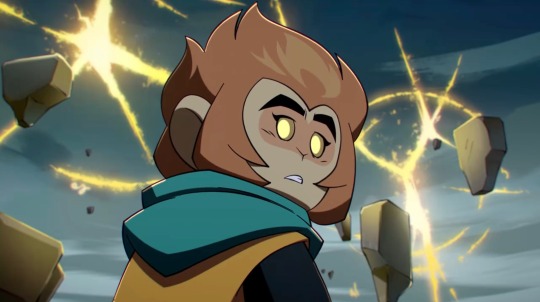
He has nothing to hide here. He’s at his lowest point, stuck in a mountain, tensions high from being abandoned by his sworn brothers, being abandoned by people he held dear. Macaque was trying to be nice, but if I were stuck in a mountain and offered food from someone who left me in such a vulnerable state? I probably wouldn’t take the it either. ALSO. We still have NOT seen these things from Wukongs perspective! Every single time something is revealed from his past, it’s narrated by Tang, Azure, Macaque, etc. Wukong has never (from my memory) spoken about his trials first-hand. This is why I love the guy so much!! What’s going on in his head? How does he feel about these things?
These are such complex characters who have been through so much, so it really bothers me when people look at Sun Wukong and decide to demonise him because of the past which, not only has he moved on from, but we have never even seen his side of the story on. Why did he kill Macaque? Did he kill Macaque? (I’ve seen theories he didn’t, we don’t know rn tho)
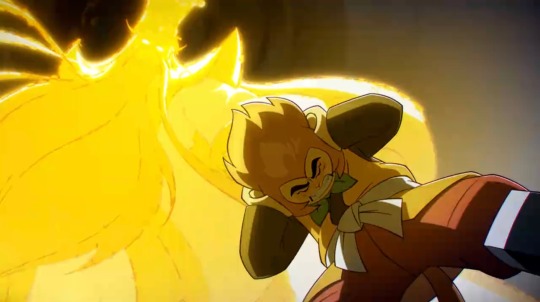
Wukong went through a lot of pain to change. Wukong is haunted by his past and in genuine distress over it. You can’t tell me this isn’t a man filled with deep remorse for his actions.
He’s not perfect, but he’s a hell of a lot better. It just really frustrates me that people disregard and discredit the work he put in to get to this point.
THATS IT THATS THE POST
This is really disorganised I’m sorry, I just keep seeing people act like Wukong is the scum of the earth and I honestly just do not get it.
Please don’t send asks about this post, just reblog or comment.
I don’t want to deal with passive aggressive (or just straight up aggressive) people.
As a final note: No, Wukong is not perfect. He’s still a deeply flawed character even with his development. No, Macaque isn’t the scum of the earth. They both have their own problems and they both fucked up. They both did something wrong. That’s the point.
#lmk#Lego monkie kid#sun wukong#lmk sun wukong#lmk wukong#wukong#lmk macaque#six eared macaque#analysis#?#more of a ramble#or a rant#it’s 11:30pm#lmk analysis#readmore
212 notes
·
View notes
Text
like the inside jacket of any good novel [tdr-verse] [college!ez x reader]
A/N: In honor of the 2k sleepover, the wonderful @amorestevens may or may not have mentioned a hope for a lil drabble with our fav academic-turned-romantic rivals... Ezekiel and his literary love. So I decided to cobble together a bit of a blurb JUST for you! But is it ever just a blurb with me? ENJOY WHATEVER UNEDITED MESS THIS IS. Summary: They’re back by popular demand, and on a not-study study date. I’m tossing in one of the prompts from the list BECAUSE I CAN: “I know it’s 2 in the morning but do you want to…” Pairing: EZ Reyes x Reader (set in the College!AU of “Those Damned Romantics”) Rating: T-ish with mentions of something more? After all, what is the inside jacket of a book but a bit of a tease as to what’s inside... ? Word Count: 1.3k HAHAHAA NOT A BLURB AND I AM DOOMED TO SUFFER.

--
When was a study date not a study date?
This isn’t a riddle -- there was a clear answer. The answer?
When said “study date” was with Ezekiel Reyes. When your pen and your notebook were tossed somewhere across the room, rather than beneath your hands, and the focus of your attention. When what was beneath your hands and what was the object of your attentions was the infuriatingly musclebound boy from your Lit Seminar. When, instead of his nose in a book it was nudging at the very center of you. When he had flipped your flashcards out of your hands in favor of slipping you out of your shirt.
The two of you had progressed passed clandestine hookups in the library beyond the sight of others and progressed to ... well, whatever this was. Where you had gone from resting against his headboard with your book in your hands to ... well, you both could fit on the bed, so enough said. To where the sight of you coming and going from his room in the baseball team’s house was not an uncommon one these days -- in plain view of god and Ezekiel’s teammates .... which, may have been everybody, as far as you were concerned.
Speaking of studying -- you really had come over to review lit notes. You had a quiz on allegory on Monday, and if you couldn’t come up with examples from one of each of the books you’d read so far this term, you were sure to fail...
And while you were determined to study the classics, Ezekiel was determined to study you. His dark eyes roved over you, as though they could see right through you. And maybe they could.
He spent every day in class reading the weighted words of the legendary romantics, eager to devour every word that would fill the pages of his own worldview, would allow him to gain an understanding of everything he felt, just what you meant to him. To give words to that which is otherwise wordless.
By nature of his major, spent his days studying. How to reason through every thought, every feeling … only to come up woefully, frustratingly short when he tried to describe what it meant to him to be with you.
A poet who couldn't articulate, grasping at metaphorical straws that manifested themselves as blank pages, unable to find a deserving word. A philosopher bereft of reason, left to puzzle and ponder through hazy, menial mental smoke.
And there you were, the sun-goddess sent to shine a beacon of light to guide his way. His Sol, his Theia.
Amorous feelings, his Aphrodite. When had that happened?
It was cliche to say that there was a thin line between love and hate. But the two of you had drawn that line time and again, hadn’t you? Flirted with it? Jumped over it? Erased it and re-written it? What exactly were you now?
Of course, Ezekiel thought, you were maddening. That was clear. But if you gave as good as you got, didn't that make you equals?
"If we’re talking allegory, then ... you're like Persephone,” EZ breathed between pecks, his lips focused in their path, an intentional line down the slope of your neck. “Freed from the underworld to bless the Earth with new life. I can't imagine a corner of the world your warmth doesn't touch.”
You sighed as his tongue escaped from behind his lips to brush a particularly sensitive spot somewhere behind your ear.
“Be careful, EZ,” you breathed. “That sounds an awful lot like love.”
You had skated your fingers beneath his shirt to map the planes of his back. Fingers that had flipped their way through page after page of historical, eternal romance. So you knew it when you saw it, when you heard it, right?
“It’s not love,” Ezekiel broke away from your neck to look into your eyes. Was it a lie if he could look you in the eye while he said it?
“It’s not?” You challenged, raising your brow at him. “Well, it isn’t allegory, either. It’s simile,” your lips quirked a mean smirk.
If he could be cruel with your feelings... it’s not as though you hadn’t shown you could give as good as you got.
You gripped his chin between your thumb and your forefinger, wrapping your legs around his tapered waist just a bit tighter as you held him in position above you on his bed. Refusing to let his amber eyes leave yours...
"And if we’re going along with your simile, Ddes that make you my Hades? Eager to have me in your warmth, to be full of the life I would give? Does my warmth reach your heart, Ezekiel?”
You rolled your hips beneath his as you spoke. What was that he had said some time before about you being a tease? Downright untrue, in your opinion.
You were all smooth skin and warm promises beneath his weight … Ezekiel was starting to think he had no choice but to ache for you this time, delighting in the crack-and-flashes of heat he knew were shooting through your writhing body at his touch. Just his touch.
He knew it was there, because he felt the heat, too. And what were the two of you, if not joined? Of one mind, and one body?
But if at first it seemed like you were winning? He would lie, lie again. Deflect
"I'm so under your skin, it's not even funny," he smirked, refusing to melt at your words as his heart was wont to do.
But everything about Ezekiel was made for romance, sculpted by an after-hours, heartsick oracle. His eyes awash like oil swirling against candlelight, his long fingers beckoning you from within, and ahem, from within... luring you, to pray to him like a wrathful god waging war on your piteous heart.
And you would play the game. Taking Ezekiel’s wrist in your hands, rocking your hips to flip the two of you so that he was beneath you now.
“Under my skin? You’re woefully unqualified to make that diagnosis,” you smarted, trailing both of your hands from Ezekiel’s waist across the rippled planes of his chest, coming to rest just beneath his collarbones, dipping your head down to brush your mouth along his. Just a slip of something sweet.
"It doesn't cost you anything to be nice, ya know," EZ’s grip tightened on your hips, as if to scold you.
You whipped your head up to meet his eyes, your grin wild, a flash of teeth.
"No? Just my time and patience, then, which I'm already woefully short on. Didn’t I come here to study?”
You made to swing your leg over, to remove yourself from Ezekiel’s space. To retrieve your notes and some semblance of sanity. Away from this clouded heat that always seemed to overtake you whenever you were around Ezekiel. Like trying to peer through stained red glass.
“We are studying,” EZ’s grip didn’t waver, keeping you in place astride his hips. “Anatomy.”
You rolled your eyes, smacking EZ’s chest with the barest swat of the back of your hand. Half-hearted. Unlike your actual heart. Which this stupid boy held in his stupid hands.
“You’re corny,” you sighed. Ever (feigned, but never Ezekiel mind) exasperated.
EZ’s lips split into his signature wide, million-watt grin. All too easy to win you over. Whose to say it wasn’t love?
“I know it’s two in the morning, but would you want to ...” EZ gestured at the rumpled, empty space beside the both of you in his bed.
“Stay?” You queried, batting your eyelashes. “Of course, Ezekiel. Who actually comes over at two to study?”
Sure, the shrieking giggles you made as Ezekiel flipped the two of you again, attacking your neck with nuzzling brushes and tickling kisses, were a little undignified. Maybe so were the gasps that Ezekiel could rip from you with an insistent tongue and clever fingers -- but girl, dignity left a long time ago with this boy, didn’t it?
---
We’re having a sleepover! Submit your requests here.
Tagging: My fellow EZ/TDR beloveds @superhoeva @joannasteez @blessedboo @brattyfics @withmyteeth @isisafrofairy @thematthewmurdock @cinewhore @artsymaddie @diaryofkali @cyarikashakira @bendro-pascarnes @moonlight-prose @phoenixhalliwell @brattyfics @luxurybeskar @justanotherblonde23 @kijahslove @flightlessangelwings @emmaveale123
#those damned romantics#raes 2k sleepover#tdr verse#college!ez x reader#ez reyes x reader#ezekiel reyes x reader#mayans mc#ez reyes#my writing#ya girl didn't start today with this on the brain but we sure ended it like that
115 notes
·
View notes
Text
Ok, Hades gameplay reaction time!
(Because I have been terrible this quarantine year about posting thoughts about stories I've been invested in, and I'm really enjoying this game, and I'm playing basically blind and I have theories, and what is tumblr for if not recording those things to look back on later.)
I love this specific kind of fantasy/speculative fiction, that straddles the line between 'allegory clearly designed to explore a real-world issue' and 'the themes of this reflect real-world issues but also everything is times one million for drama and setting's sake'. I love it so much. Because, look, this is a story about a teenager/young adult trying to gather up the skills and resources and help he needs to escape his controlling, possessive, emotionally abusive father's house. That's it. Strip away all of the trappings, and that's what the story is about. By comparison, I think about Star Wars. (I love Star Wars too.) That's also a story about a dysfunctional fucked-up family dynamic. But that family is fucked up because dad went on a magic-corruption-induced killing spree, and his twin children were separated at birth to be raised in seclusion with the intention of someday taking him down, and look, that's cool, but it's definitely not how people actually are. All of the dysfunction in that family is an outgrowth of the fantastical setting, which means it is fantastical dysfunction. It can occasionally mirror or remind us of real-life interactions, but it's a fantasy. Which is great and fun to watch and very comforting and so on, but I don't necessarily want that in every story, and I love Hades because it is not that, at all. When you extend out the basic 'kid trying to escape his toxic home environment', Hades is the story of Zagreus trying to get out with the help of his dad's estranged, complicated, wealthy and powerful family, who are absolutely part of the reason why dad is Like That in the first place, and may not be any more reliable in the long run but who he needs right now. And his stepmom and teacher, who love him enough to help him leave, unconditionally and supportively (ask me how many feelings I have about 'look, Hades can't hurt me for helping you, don't worry about me, I am going to take care of you and that means helping you get out of this house' coming from an adult authority figure, ask me). And his dad's employees, who like him but also have to fear the old man's wrath, and walk that line in different places the best they can. And stepmom's long-estranged parent, because this is a story about families and how they split apart and come back together. And all of that is so real, so grounded in actual, concrete, this-is-how-humans-work family dynamics. But it's also individual. The story works so well because Hades isn't just a silhouette of the controlling asshole father; he is clearly The Way He Is for reasons, complicated ones, good and bad alike. The Way He Is has details, particularities, paperwork, a dog he pretends not to love and rely on. He is specific. Nyx and Achilles are specific, not just generic kind stepmom here to be a trope inversion and cardboard cutout teacher. Nyx has backstory and personality of her own, Achilles has a complex history, opinions, a missing lover, and they BOTH have very particular relationships with Hades that aren't just boilerplate script. Yes, there's abstraction there, you meet these characters in brief visual novel-esque three-line conversations over the course of dozens of escape runs, of course there's abstraction--but there's the very real sense that all of these people have nuance, have good and bad days, that they've made choices to be who they are, even if we don't know what those choices are yet. And, like Star Wars, some of the ways in which this story is so specific rely entirely on the fact of the otherworldly setting! I've seen stories that go the other way, that try to use their setting entirely as window dressing, and they end up feeling so flat I can't even remember them right now because they don't let the environment lend complexity and nuance to their characters at all. The environment these characters live in matters. The absolute control Hades exerts over his surroundings is a divine power. The fact that everyone Zag runs into, for or against him, is either immortal or immortally dead, changes how the react to
one another and to the situation at hand. The shape of his attempted escapes (gauntlet combat with a variety of legendary weapons) might be an allegorical construct of the genre, true, but it doesn't work in any sort of real-world setting where there exists the possibility of authority figures above or aside from Hades and his extended fucked-up family. That's part of why the family is so fucked-up in the first place. But these changes still fit well within the realm of, 'yeah, if you took this extremely real-life dynamic and added these factors to it, I can envision people doing this thing'. I can envision these specific people doing this thing. They add to the specificity of these characters. Letting them be influenced by their unreal surroundings makes them more real. So hell yes for good storytelling!!!!
I'm still relatively early in the game (by which I mean I'm like thirty runs in but only just got past Meg for the third time, because I am not good at this game, although in my defense it's only the seventh video game and second button-mashing game I have ever played in my life so there's that), but I'm starting to develop suspicions about Persephone. Because, look, outside of Persephone's absence from the underworld, this story knows its Greek mythology, uses it, revels in it. And there is some kind of mystery still shrouding Persephone leaving in the first place. She left a goodbye to Cerberus in her letter but not to her own son. Nyx has warned Zagreus multiple times not to let the Olympians know she's his mother. He literally never even knew she existed. That's complicated! Add to that, Persephone left--the exact thing we are trying and failing to do again and again and again. She left with one note, which means either she managed a one-shot speedrun out of the entire realm or she had some other way to leave, because if she'd washed up in the Styx pool to plod back to her room and try again, she wouldn't've needed to leave the note in the first place. And, you know, she's Persephone. Really quite famous for leaving the Underworld! Also quite famous for being forced back. So. I'm wondering if Zagreus, so conspicuously absent from her goodbye, has something to do with it after all. Six pomegranate seeds condemned Persephone to six months, half a year, half her life. I wonder if a child that's half of her her constitutes a fitting trade instead. Which, of course Hades would be even more resentful and dismissive and cruel to the kid he got in place of the wife he loved (who he chased away by being cold in the first place). Of course Persephone would have difficulty saying goodbye to her son in those circumstances. It would make sense. The tricky thing here is how the Olympians fit into it, because I also suspect the rift between Hades and Zeus sprang from Persephone's departure. And yet, if the Olympians never knew Zagreus existed, let alone that he's Persephone's son--how can he count as payment into the deal in their eyes? So in that case, what does Zeus think is the justification for Persephone leaving, after the pomegranate thing? Or are we just not doing the pomegranate thing at all? It would be a shame to lose it entirely, out of a story that really seems to enjoy the myths it's playing with. And there should be something complex here, something more than simply 'mom fucked off and left because dad sucked and now I'm following her because same'. It feels more complex than that. 'Mom and dad had a baby to try and save their marriage, it didn't work, but when mom left she had to leave me behind because otherwise dad would have gotten the cops and her extended family involved' feels more right, while still just as grounded in reality as the story has been so far.
I sort of want to write some meta about how each of the six legendary weapons corresponds to their original divine wielder, but I haven't unlocked all of their codex entries yet (look I am very bad with ranged weapons in this game ok, I am working on it), and I still need to think about the details. Aside from, of course, fuck yes of course Hestia's the one with the railgun. Leave drama and elegance and traditional weaponry to her brothers and sister (Demeter, who knows how to get her hands dirty, gets a pass). Hestia is out here to get shit done. With a grenade launcher.
#hades#hades game#zagreus#hades spoilers#I do not know this fandom are there tags I should be using?#C plays stuff#long post#driveby meta attack
81 notes
·
View notes
Text
Peaches MV and mythology 🍑
Remember this?

What was Jongin trying to say by showing us the Iliad? In my opinion, he was giving us the key to understanding Peaches.
A quick research tells us that peaches in Korean culture represent happiness, riches, honours, and longevity, and they can also keep evil spirits away (I'm not Korean, feel free to correct me if I'm wrong!). To a Korean, the references to their own culture in the Peaches mv are clear and immediate. To someone of European culture like myself, maybe not so much.
In Chinese culture, as well, peaches have similar characteristics. Quoting from Wikipedia "in Chinese mythology, Peaches of Immortality are consumed by the immortals due to their mystic virtue of conferring longevity on all who eat them."
Reading the same article, I saw that there are references to peaches in Journey to the West, and that they are directly tied to Sun Wukong (flying on a cloud, anyone?). I'll leave you the link here.
Now let's take a step further and look at Greek mythology: is there some kind of "forbidden fruit" that we know of in that tradition? The answer is yes, the Golden Apples in the garden of the Hesperides. The apples belonged to Hera, and "the Hesperides were given the task of tending to the grove, but occasionally picked apples from it themselves. Not trusting them, Hera also placed in the garden an immortal, never-sleeping, hundred-headed dragon named Ladon as an additional safeguard."

This is where the book about Achilles and Patroclus comes in handy! The golden apple was crucial to the start of the Trojan war. In fact, "in the myth of the Judgement of Paris, it was from the Garden that Eris, Goddess of Discord, obtained the Apple of Discord, which led to the Trojan War."
That's what I meant by saying that Jongin was giving us a key. There are several ways to look at the Peaches mv depending on what kind of mythology you grew up with. By putting Achilles and Patroclus in the teaser it's like Jongin was telling us just that.
How to interpret the prologue, then?
I'm European and of course I grew up reading about Greek mythology so I can only give my biased opinion on it. When I first saw the prologue, I immediately thought of three things: Plato's allegory of the cave, the myth of Narcissus, and Orpheus and Eurydice.
I'm not too sure about the connection to the first two, but I think that Orpheus' journey to the underworld might be spot-on. Caves in Greek mythology are places that connect the living with the dead, and in that way they might also represent spiritual journeys. They are also connected to seers and prophecies.
At the start of the prologue, Jongin appears to be dying, but he manages to reach that pool of water. Does he fall in? After that, we see him in the cave and, at the end, ascend in a pool of light. Is the woman guiding him through this journey?




Is this the story of how he achieved immortality? Did he go through the cave to leave behind his mortal body and become a deity? Was that pool of water the fountain of youth?
It would be interesting to try and connect Peaches and the prologue to the story told in Mmmh. Any ideas?
11 notes
·
View notes
Note
Hello Laura,
I’m 98% sure I’m accidentally going to end up rambling with this and also this may seem like a outta left field ask so... fair warning and I’m sorry in advance if it comes off as ‘huh?’ or something like that.
I’ve been out of the loop for a few days now and just logged on to see the Constellations Ask Game.
Personally, I love love LOVE comparing different methods like
horoscopes
zodiac
astrology/constellations
birth signs
cartomancy (probably one of my favs - I find this one really interesting)
tarot cards (both different and similar to cartomancy and vice versa... but, my opinion, these 2 methods are more different than they are similar)
palmistry
numerology
pendulums
spirit animals
and other fortune/horoscope telling methods/tools from all over the world through history. Practices like these and others alike that are scattered through history can seem small and insignificant in the grand scheme of things with everything that’s happened throughout the centuries...
but things like this, knowing the symbolism of something can give you a better insight of understanding different religions, mythologies, demonology, art, cinema, literature, etc. etc. because at the end of the day, when there isn’t much to go on, how symbolism is interpreted by someone and then used in whatever belief or work; based off of said interpretation can lead you to draw allegories between works, beliefs, or societies you probably would’ve never thought could’ve gotten something from one another; regardless if it was conscientiously or not - symbolism can open the doors to questions like
Why did this culture choose this to represent that?
Were they an isolated society that made it up on their own or could they have learned it from someone/somewhere else?
What was the interpretation then and the connection to how it is viewed today?
What allegorical conclusions can be drawn between this method ‘originated’ at point a and that method ‘originated’ at point b - if these two cultures are on opposite sides of the world and had to foreseeable means of communication with each other?
Etc. Etc.
& That’s one of my favorite aspects about Black Clover other than the story itself and the captain/magic-knight eye candy: Tabata’s use of symbolism and mythology is a talent in of itself; the way he dissects the tiniest context of something from various European mythologies and then uses it to his full advantage to hide in the crevices of a character, continually builds upon each reference and said reference(s) will start to reveal itself(themselves) as the character(a) develops throughout the progression of the story... sorry that was a bit of a tangent - but Tabata’s use of these things throughout Black Clover is so ingenious he deserves recognition and praise for that aspect of his storytelling...
I’m rambling aren’t I? (i warned you at the beginning this wasn’t going to be a conventional ask, sorry if I keep getting off topic) SO THE POINT OF THIS ASK — THE CONSTELLATIONS ASK GAME – I already knew there was a whole plethora of constellations named after figures in Greek mythology... however I was only briefly aware of a handful of Greek Mythology constellations that were used in astrology personality/horoscope predictions like our typical western Aries/Taurus/Gemini/Cancer/Leo(plod)/Virgo/Libra/Scorpius/Sagittarius/Capricornus/Aquarius/Pisces.
Dang it! I was rambling again wasn’t I? Stop rambling me! MY POINT IS: this ask game is one of the first times I’ve seen this many Greek Mythology constellations used that are apparently also used similarly to western zodiac astrology/horoscopes...
SO Laura, I was just wondering if you could please tell me if you knew the name or branch where these constellations stem from - in terms of fortune telling and birth signs? or just any knowledge basically you have in general related to the following?
Andromeda
Cassiopeia
Corvus
Draco
Hydra
Lyra
Persei
Pyxis
(tbh, going down the list, with all the Greek mythology references I almost asked about Taurus too because I read it as ‘Tartarus’ 😅)
Ursa Major
Ursa Minor
Apus
Aquila
Caelum
Canis Major
Crux
Indus
Lupus
Musca
Orion
Pavo
Phoenix
Puppis
Laura, if this is all too odd of an ask I completely understand... and again I apologize for how overboard I can get with my rambling... I just get very passionate and excited so when you’re trying to type it all down vs. talking to someone face to face where it’s easier to read social cues... it’s more difficult remembering when to cut off the sentence and shut up... like now🤭
Always, always, always enjoy your blog Laura! Regardless if this gets answered or not - I hope you have a lovely rest of your day!
Hiya anon~! ^_^
No worries, no worries, we all can ramble when we get exited!
But let me, let me try to get a hold of this first 😅
Okay, so:
I am not that well versed in mythology, but I do have a kind of fondness for it.
Andromeda & Cassiopeia: I believe that she was a princess in Greek mythology, the daughter of Cassiopeia. And the story goes that Cassiopeia boasted about being the most beautiful, which angers Poseidon. And Poseidon then sends a kind of sea monster (or a dragon) to torment the nation. Andromeda is to be sacrificed for the beast in an effort to calm it, but she gets saved Perseus (who later marries her and makes her his queen). And "Andromeda" apparently means "Ruler of men".
I don't know if the name "Cassiopeia" means anything, but it seems to be connected to beauty.
Corvus: It's a constellation that was known as "Raven" in some point, and was apparently one of the constellations that marked the Gates of the Underworld. So, an omen of death.
Hydra: Hydra was also another constellation to mark the Gate to the Underworld, and a general symbol/omen for death. Of course, there's the Hydra that Heracles defeated as his 12 heroic acts.
Draco: I might be mistaken, but I believe that Draco might be another name for Hyra. (If anyone knows better, please do correct me)
Persei: Is a triple star system, that I suspect is referring to Perseus. (Or named after Perseus)
Pyxis: I have no clue.
Okay, I'll... I'll answer on the longer list of constellations a bit later (because I need to wrap my brain around it). But I thought that I'd give a little something already now so that I don't keep you hanging 😅
And in the meantime, I do hope that you have a great day as well! ^_^
8 notes
·
View notes
Note
Please do a tarot reading on bts personality? Thank you
if we’re talking personality, it’s time for the big guns. i promised i’d use this deck to an anon, today we’re doing a shaman soul reading.

Jungkook: THE RAINBOW
A sign that the end of the storm is near. This card is truly blessed and imbued with great innocence because that’s exactly what Jungkook is. It’s the “everything is alright” signal: The rainbow symbolizes completion of the soul in the Himalayan region where shamans consider rainbows a bridge to the afterlife. Believe it or not: What we see as JK is the last incarnation of his line. His journey is basically complete (!), it is whole. He’s found what we will all find and the end which is a state of profound happiness. There’s a reason why he brings so much ease, fun, and talent everywhere he goes. That sense of lightness and positivity is deeply embedded in him. Brightness, bubbliness, fleeting moods but always optimistic. His personality is all about joy and the feeling of soaring high. It’s not a farce we see on camera, he really is like that. What I noticed is. Since we see a colorful bird dashing forward on a ray of light, I believe JK is headed somewhere blissful, and he’s headed there fast. The pot of gold at the end of the rainbow, pretty much. Not just the shamans in Nepal consider the rainbow as an arch, Norse ones do, too. The Bifröst bridge connects Midgard to the Æsir. Jungkook has a sort of divine connection going on. That’s why his personality is dignified. Bifröst is translated to ‘shimmering path’, that he got famous was destined from the beginning.

Hoseok: THE SWEAT LODGE
Hey, Mama. I am not surprised that this card is all about a connection to mother earth and all things maternal. The hut — and the ritual that is behind it — is essentially an image for the womb. Hoseok is looking for that warm and cozy feeling in his life. That tells you a whole lot about the personality we rarely see on stage, it’s a much calmer state. The act of sweating disperses old habits and bad thoughts, this is precisely what he seeks. That blissful, protected place/state of being attracts him, or rather, draws him back into his past. His character is so youthful and cheery because he longs for a space like the sweat lodge that leaves you relaxed, drained from the weight of the world, and without sorrows. What he longs for is purity. He’s let go of demons and phases in his life he’s grown out of. His goal is to feel renewed and being without baggage. Note also that the sweat lodge is a community place. He is deeply social, it’s not an act. Hoseok aspires to be a nurturing figure in the future, and peace is very important to him.
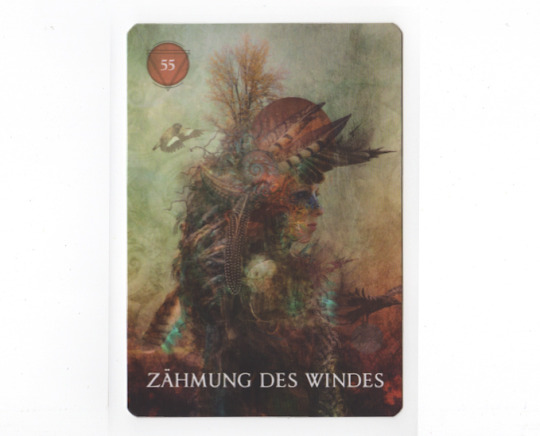
Jin: TAMING THE WIND
Think about it: Something as dynamic as air representing Jin makes a lot of sense. He might be a fire sign, but air is nonetheless strong in him. He is a person who is self-directed and cannot be grasped at any time. Air does what it wants, and few other forces can stop it. On top of that, wind is malleable. It can be completely still, gently blowing, come on strong, or be a flat out hurricane. The different levels of intensity are all present in Jin’s character. As in, he can be the introvert of all introverts only to turn into extroversion embodied. The card tells us about just how versatile he can be. That he will achieve more consistency in the future is represented by the act of taming: Yes, he will settle. Visually, the feather is the most important part of this card. It symbolizes a holy dedication to life and distributes smoke during shaman rituals. It can also be interpreted as a pointer when you’re in alignment. So, I’d describe Jin’s character as something that dispels the old to bring about harmony. Thus, he is wild and tame alike. Very interesting duality.

Namjoon: THUNDER
Next to Jimin’s card, this is the most powerful one I pulled. If you’re familiar with The Tower in tarot, THUNDER is similar. Especially in its spiritual weight. Thunder always hails of new things coming. Namjoon is that kind of vanguard. Even his voice booms like thunder man, that’s no coincidence. That he’s the leader of one of the most famous boy groups on this planet means something dramatic and big coming our way. At his core, he is revolutionary. Namjoon is Namjoon because of his message that’s loud, terrifying to great many a hater, and a call to awakening. I am certain he is on his way to enlightenment, I’m not kidding. Because think about, thunder comes first, then: lightning. It describes his personality progression well: Namjoon did a full 180° in the last years. He did all of his shadow work. This card always says a person is about to fulfill their purpose, so he’s currently at the very brink. He is scared to the core but knows that he’s destined for great things. Like buffalos storming ahead, he is unstoppable just like that. It’s because of him that the game changes 😊
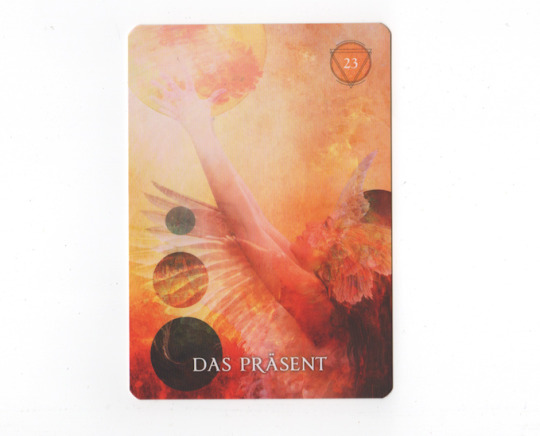
Yoongi: THE PRESENT
Beside the literal interpretation of Yoongi being a present to this world which truly is the case, this card also means unconditional offering in a general sense. You’d think it’s his wonderful music that he has gifted us. The meaning of the card says otherwise, things go deeper, it’s about something that is not material in nature. Only true love and true feelings can fully belong to a person and they can give them as a present. I think this is what Yoongi’s personality at its deepest level is about. He is a generous man. Who is more giving than someone so dedicated and full of tender emotions. The card is also a signifier of gratitude, and I think Yoongi truly is thankful. The winged woman shown on the card lifts up the sun, which tells me Yoongi wants to uphold joy and that he was sent to us as an angelic, radiant being. Lil’ cherub he is. The card is colored in such a bright yellow and orange way, I think he could be a kind of light worker, even, if you’re familiar with this concept. What Yoongi’s aim is at its most basic level is to gain access to the happiness of life. And he wishes so dearly we experience it, too. I need a moment.
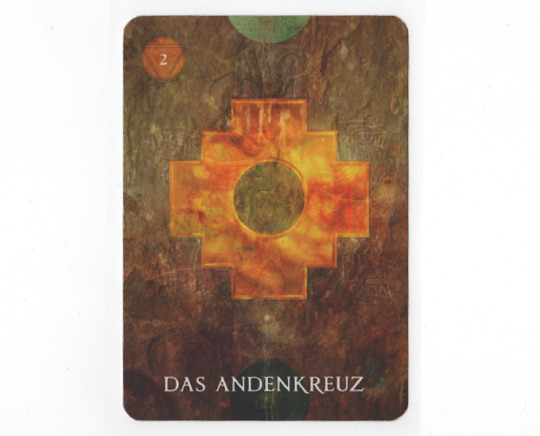
Jimin: THE INCA CROSS
Ooof. Oh shit. This card is a massive fucking deal. I’m stunned every time I see it. It has a huge wtf factor. A simple but overarching symbol. To shamans, the Inca Cross symbolizes all directions and dimensions coming together. It even connects the Underworld with the Gods themselves. It also has a hole in the middle, allowing us to travel to a different perspective. It tells me Jimin is the one holding everything around him together with his personality. He is that cross, a compass basically. He has access to greater wisdom. The Inca Cross is a big leap, this is what Jimin essentially is. What he exudes propels us forward and unites us. He can make people change their mind and direction in life. He is only halfway aware of that skill. I wouldn’t mess with him either way, he is the true axis of Bangtan. The crucial (=cross-like!) one, even Namjoon said that. Now what’s also important is not just the cross itself but also the color. It is made of solid gold, a very warm tone. His charm and soothing character is innate to Jimin, and that is a regal feat. It’s very important that he knows his worth, that is the crux —cross— of the matter. Now this is where it gets really metaphysical: That the Inca Cross bridges the lower, middle (Human), and upper realm to shamans in Peru is no coincidence. It tells us Jimin was sent from a place that is not this, aka the middle world. I think even people who are not into spirituality can feel that. He is either a saved soul from the Underworld so this is his first incarnation after a long time or he was sent from the Gods. Because the cross connects all worlds, it could even be both at the same time. And since the Inca Cross allows dimension and time travel (!)… maybe he can do even that. This card is telling me the wildest shit.

Taehyung: HEART OF SKY
During the last tarot readings I drew The Empress for him several times, the energy is no different here. This card has Queen of the Night type of imagery. It’s a very dreamy, whimsical woman immersed in melancholy, dressed in lavish garments. It’s not hard to see the parallel to Taehyung’s character. He is just as nostalgic and concerned with all things that bring more beauty to this planet. That is his purpose. I repeat: Taehyung is here to spread the fine things in life to bring us sophistication and wholesomeness. The Heart of Sky is quite possibly the card most connected to creativity and love. It encourages the one receiving it to paint. We know he’s already an artist at heart, the shaman cards know it, too. Heart of Sky means to pour out your emotions. And to show all your talents in a gorgeous way. The card is just… spot on. Nighttime plays an important role in this illustration, Tae is more Moon than Sun in personality. He’s in tune not just with his divine masculine, but also feminine. Perfect balance. The Heart of Sky carries with it a strong ethical component also, that means Taehyung is figuring out his intent very often. He’s a benevolent person, a creator. A good person, a benevolent heart. He wants the best for everyone, you and me, anybody.
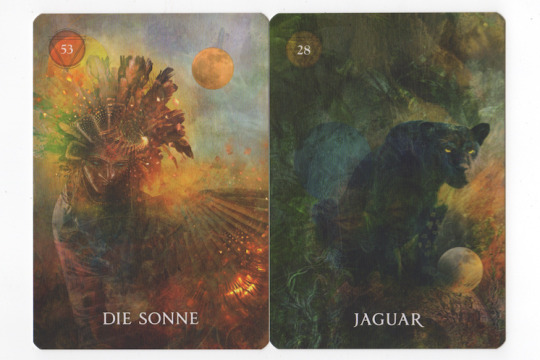
Bangtan: THE SUN
I also pulled a card for the personality of the group as a sum. THE SUN is pretty straightforward: BTS are luminaries, a figurative giant. A super-star. Shamans connect the sun to male energy so the allegory fits, there’s a bright and positive masculine quality in their work. BTS are a hot topic and the energy is high. Sometimes even overpowered because their solar pizzazz is so ardent — burning out is the #1 danger here. That’s why the members connected to the moon and night (Joon, Tae, Yoongi, to some extent Jimin) are so important to balance everything. Passion, humor, creativity, playfulness are always around when BTS is near. The sun is at the center or the universe and widely seen, the group indeed takes that center spot right now. Many other life forms depend on the sun, revolve around it, BTS and their light are needed. If they fall, a system collapses. The card tells us they are currently at their zenith, truly radiant now, soaring like the winged spirit on the card. Also, to state the obvious: Come on, who’s the sun of BTS? Hobi’s personality sticks out the most, reflects back to the group dynamic. This is his card and time to shine. He makes or breaks the deal and the cards know it. He sets the tone.
bighit: THE JAGUAR
I wanted to see what the personality of bighit as a whole is, too. Unsurprisingly — what came out is an animal who’s a roaring force to be reckoned with. The energy is a lot more competitive and serious compared to The Sun. I find it convincing and see why these cards came out: Lighthearted group, big business company. Now, the Jaguar has a dark side as well as extreme advantages. He sure doesn’t look like the scariest animal ever, but being on top of the food chain allows him to do whatever he pleases: He’ll never be prey. On the other hand, he is protected because he’s so strong. Bighit does have that quality of being untouchable. Much like the jaguar, it’s an undertaking that operated in the shadows for long. We know that Bang PD claims to have the secret success formula and isn’t as public as say Lee Soo Man and JYP. There is a component of mystery, and the other companies are careful because of it. On the light side, BTS certainly have powerful and rational guidance. To give an analogy from the jungle book: Bighit is like Bagheera, the voice of reason, infusing BTS with strength and knowledge.

if you like my readings, support your local tiger on ko-fi 🐅
#holy moly jimin's card#bts#bts tarot#bts shaman reading#tarot#anon#bts oracle cards#bts oracle reading#cub mail 🐅
358 notes
·
View notes
Text
princess-nazario:
It's ok, thanks for clearing things up. See, everytime theres a post that might just be different the tumblr-fad! Version you speak or questions how tumblr might be romanticizing them theres always annoying people in the replies saying that theres a version where she wanders down the underworld herself, or that the version where shes kidnapped is...weak or a damsel in distress since it doesnt fit into tumblrs made idea of empowerment?? Its so annoying honestly. I saw this kind of stuff in a lot of posts while exploring the greek myth tag and its just... infuriating. I definitely should ignore them but it seriously makes me kind of sad and angry at the same time? The hades and persephone posts are everything(mostly tumblr-fad!) Version I reread your original post and yes I do agree, tumblr-fad! Persephone does take away a lot of the complexities and archetypes I read you examine. I think Hadestown might portray Hades and Persephone's power struggle well, it doesnt completely ignore the implications its giving off for the sake of some romance. This is what tumblr is doing and it's really annoying. By doing this and reducing the characters here to simple boxes it's taking away your interest in the myth, I think that's what you meant? I think your study of Hades/the underworld being Persephones self, cthonic meaning "spirit of nature within, inner self" while I dont fully understand that's really cool. I especially dislike how woobified and depowered he usually is in the tumblr-fad! Theres a lot you can work with him as the antagonist in a retelling I think. In fact maybe itd be great to have a retelling that explores the power struggle between Hades and Persephone and shows how Persephone gets through adversity and becomes of equal power through oppressive authority? Thatd be really cool. Tumblr-fad! Version is the twilight of myths but kind of the opposite. In twilight, the author itself romanticizes the creepiness and power struggle that might be there between Edward itself(although Bella does have a lot of agency so I think that's why it resonated so much with female readers?) while the Persephone has a various amount of versions, most versions being she was kidnapped/abduction with many meanings and metaphors and allegories to things, and tumblr-fad! Version ignores nuance in favor of their ships. Thanks for being so open and honest about this, I honestly was stressed because I thought my response maybe being immature or uninformed might be irritating or annoying. I haven't been sneaking through your blog or anything like that, I just saw your original post in the goddess demeter tag so I searched up "Persephone" on your stuff since I was curious with what else you might have to say about it. I wish Tumblr could maybe bother to learn something called not everything is entirely not THIS thing or the OTHER and maybe do something different from what Hades and Persephone coming to be known as the peak of all love stories on the website.
@princess-nazario I hope you don’t mind, I copy pasted your last reblog into a new post thread because the last one was getting massive.
I think I’m starting to understand what you’re getting at regarding the perception of victims as “weak,” and it makes a lot of sense. Thank you for clarifying regarding the “damsel in distress” trope because that’s when it clicked for me what you were talking about. I actually agree on that point, I think there is a tendency for pop feminism to kind of portray more vulnerable, sensitive or fragile women as less feminist, so I can see how you’re applying that to your views on how people on tumblr perceive the story of Hades and Persephone.
That said, I think you have a lot of different angles you’re looking at this whole thing from, and that’s great! However I think there’s so many subjects you are trying to tackle here that it seems like you are kind of are only half informed about, maybe from exploring discussions online. I think this is resulting in conclusions that are kind of confused and lacking in more solid foundations, if that makes sense. I think maybe you might benefit from exploring each element further on their own merits.
For example, did you know that there are a lot of different feminist viewpoints on Twilight itself? And not all feminists completely condemn it? In my opinion, there are a lot of things about Twilight to criticize, however there was a distinct element of hatred for the interests and desires of teenage girls involved with how people responded en masse to the Twilight phenomenon. I don’t think you were old enough to be directly familiar with all this at the time. I think a decent primer would be this video from Lindsay Ellis (tho please keep in mind that some of her most recent content is not for younger audiences). It doesn’t cover all angles of the topic, but it does give an alternative perspective in retrospect about the raging Twilight hate that swept through pop culture for a long time:
youtube
Also, there is a whole conversation to be had about the concept of “woobification,” and why that word exists, as well as how it is used in conversations about girls and women’s fantasies. The original post I made shows that I have my own frustrations when male villains and darker archetypes are whittled down to something seemingly non-threatening and “socially acceptable” myself (like...turning the beast into the prince in Disney’s Beauty and the Beast), but in my experience, people have often used the word “woobie” to describe any explorations of the vulnerability of these types of male characters when women do so because they find those men intriguing or attractive, and that can get kind of tricky because in many ways, those conversations can harbor a subtle resentment and shaming towards female fantasties, period.
I’m getting the impression that maybe there’s something about Hades and Persephone, or at least the archetypes they embody, that really intrigues you, but you’re not sure what you are supposed to think and feel about it from a feminist perspective. That’s ok, ultimately you’ll figure it out on your own. I can’t tell you what to think about the myths themselves on their own, separate from contemporary feminist media because that’s ultimately it’s own thing, and you can springboard your own perspectives and reimagining off of the original in any way that feels right to you.
What I can do though, is leave you with some age-apropriate content that I was consuming at your age, as well as a link to a site that explores stories with similar archetypes that Persephone embodies.
The site is called Girls Underground, and it explores and catalogues stories about girls who go on heroine’s journeys in the “Cthonic” context like I was talking about, as in exploring their own inner psyches through the experience of traversing a strange, scary, magical place. Sometimes these stories involve the trope of a spooky attractive male character who takes on an adversarial role that is sometimes also romantically charged, but not all of them do. I think the resources page may be of particular interest to you because it links to essays on subjects within this genre of storytelling. The Examples page has a ton of other stories not listed here that you can take a look at, however not all of them (but many of them!) are kid friendly.
Movies that I would recommend:
Labyrinth (1986), which was my favorite film since early childhood, and is the reason I love these types of stories to begin with.
Legend(1985), which doesn’t depict a healthy dynamic, but is a great film and does have a big place in the general conversation about this type of storytelling.
Howl’s Moving Castle, either the book or the film.
Pan’s Labyrinth is rated R for some gore and violence, and it has scary moments, but I think it’s fine for most teens. The character of Pan is not part of that whole “demon lover” trope because the heroine is a small child, but he takes on a similar role in terms of being a figure that embodies the underworld and thus a major part of the heroine’s psyche.
Honestly, I would consider Disney’s Beauty and the Beast (the original, not the live action remake) a good rendition. It was written by a woman.
Jean Cocteau’s black and white La Belle et La Bete.
Jane Eyre by Charlotte Bronte, or a film adaptation of the same.
Rebecca by Daphne DuMarier, which is what my username is from. I’m fond of the Hitchcock film adaptation.
Honestly, the 2004 adaptation of Phantom of the Opera is...flawed, but it was my introduction to Phantom, and it’s a lot of melodramatic fun.
It’s worth noting that in a lot of these stories, there are not perfect, healthy relationships depicted between men and women. There is cruelty, there is harm. But in many cases, that does not mean these stories have nothing to say about relationships between men and women, nor does it say that they are solely tales about abuse and we cannot find romanticism within them. Each story has it’s own flaws, it’s own strengths, hold deeper meanings beyond the surface. They contribute something distinct to a rich history of artistic explorations of the dynamics of power in romance and the female experience with our own desires within a patriarchal society.
7 notes
·
View notes
Text
Demeter: More Than Just An Overbearing Mother
So, I don't know what's up with this new trend of Demeter being portrayed as an overbearing, overprotective helicopter mom, and nothing else. I suppose in a way I see how it happened—the rape of Persephone is one of the more pervasive myths that essentially everybody knows, and with more modern retellings, they like to cast Demeter as the bad guy, rather than acknowledging ancient Greece was a different culture, that myths aren't meant to be taken entirely seriously—that though they tell us a lot, they're primary purpose was worship and entertainment—and that there's no real "bad guy" to this story. And because it's a more popular myth, not much else is attributed to Demeter.
So this is going to be a really long post, debunking the popular beliefs about Demeter, and sort of bringing more of her actual character to light, with a special focus on the abduction of Persephone, as the modern world is really, ah, let's say ignorant, to the actual connotations of that story.
Demeter was an agricultural goddess, associated with grain and bread, which was a staple food for the ancient Greeks. She was also, by contrast, the goddess of starvation and hunger. So she could bless your drops to flourish, or your crops would fail and hunger would quickly follow. Because of this alone, she was majorly important to the Greeks, but it also wasn't her only role. Like many gods, Demeter was very multifaceted and held many different roles throughout Greek society.
Perhaps less importantly, due to the nature of wheat in ancient societies, Demeter also presided over fruits and vegetables, with only some exceptions. Olives, as those were Athena's; grapes, as Dionysos already presided over those; pomegranates, as those were sort of her daughter's thing; and beans, which for whatever reason, was seen as impure by the Greeks. She also had some association with flowers, especially with the fruit-bearing variety, but not enough for me to say that it's her "domain."
Porridge, another staple food, was also something she had dominion over, and it was used ritually in her Mysteries and cults across Greece.
Thoughout Greece, Demeter had been worshipped as "Law-Giver," or Thesmophoros, was regarded as the goddess who instructed mankind in law.
She also came to be associated with the Afterlife, as she apparently had taught the Mysteries how to get a good deal on the Afterlife through worship and rites. It's unknown what those rites were, but in case you're curious, I'll give you some advice—don't disrespect Persephone, ever.
Either way, Demeter was majorly important to the Greeks, who saw her as a stern, doughty woman, mature, but still quite beautiful, of course.
So, that's all well and good, but you probably already knew Demeter was an agricultural goddess, often associated and appropriated to Isis, and you haven't really learned anything to contradict your opinion of her, except that she was actually one of the most important goddesses there were.
So let's talk about her mythos and her personality for a bit. Who was Demeter, exactly?
She was among the six children of Kronos and Rhea, and is the second oldest child. After being released from Kronos, she was mostly fostered in by Okeanos and Tethys, along with Hera.
During the war of the giants, she most likely either bore a golden sword and a shield, which was an epithet of hers—the Lady of the Golden Sword—or a torch and spear. Either way, she was an active participant in the war against the giants.
So...the abduction of Persephone, her daughter. First, you need some background. And not just some, but a lot, because setting the stage is sort of important here.
So, before Persephone was born, or even conceived, according to most myth, Demeter was being pursued by Zeus. She transformed into a snake to hide, but that didn't work so well. So, that was Persephone's conception story. Not so fun.
Because of this, Demeter sort of wanted to protect her daughter, because the gods were very ravenous, to say the least. And she was right—in some myths, both Apollo and Hermes asked for Persephone's hand, which Demeter outright refused. However, there's not a ton of information on Persephone as a young goddess, so there's not a ton to go off of. We know Demeter trusted her around her sisters, Athena and Artemis, otherwise known as two-thirds of the maiden goddesses, and nymphs.
But, again, we don't know a lot of Persephone's childhood, or how Demeter mothered her. We just knew, that when Persephone was kidnapped, she was gathering flowers with Athena and Artemis. Only some myths say she was hidden away from other gods. It appears the really wasn't though, just that Demeter wasn't too keen on her getting married.
So Persephone's taken to the Underworld. Now what?
Well, firstly, Demeter had no idea what had happened to Persephone. The only people to witness her kidnapping, was Helios and Hekate. So when Demeter came to find her gone, she tore off her cloak and her head-covering, as was pretty customary for grieving in the ancient times, and immediately went looking for her. No one told her the truth of what happened, I imagine because they were afraid of her wrath, as Demeter was known to be a wrathful goddess in general. So for around ten days, she went searching for Persephone, and on the tenth, Hekate pointed her to Helios, who saw everything. We also learn here that seasons already existed and that Demeter was responsible for changing them.
Anyway, Helios told her what happened and that's when Demeter exiled herself, feeling incredibly betrayed and angry with Zeus, and completely grief-stricken.
Not because she thought Hades was unfitting or because she wasn't ready to let Persephone go—because no one, god or otherwise, except Hermes, could travel between realms, at the time, and Zeus had given Hades permission, which meant the marriage was valid, but Greek standards at the time, so there was no reason to get her. Essentially, Persephone died and Demeter would never see her beloved daughter again.
She became an old woman, and sat next to a well in Eleusis, and greived. When asked, she told people she came from Crete and had been kidnapped by pirates. Eventually, she became a nanny of sorts, caring for the King of Eleusis's son, as if he were her own, and fed him ambrosia and necter, in order to make him immortal. Long story short, it didn't work out because the mother ruined her process, and so, enraged, she left, but not before revealing her true form and cursing the woman.
The obvious message here is, she was trying to replace Persephone with a new child, to fill that void in her heart.
She continued to hide away in her temple in Eleusis for one year, causing a huge famine and many mortals would strange to death in this time, before Zeus sent Iris to go talk to Demeter. She told Iris she wouldn't do anything until she could see Persephone with her own two eyes.
So Hermes goes to get her, and she returns, though only after Hades promised she could return to the Underworld and be his queen, mind you.
It was decided she'd stay for one half of the year in the Underworld, fall and winter, and then in summer and spring with her mother.
(Also during her search for Persephone, she was pursued by Poseidon. That's not super important, but just so you know.)
In case it wasn't obvious, the whole myth is an allegory for a grieving mother after losing her child—not even just to death, though that's the more relevant take away in modern times, but in marriage, because a daughter essentially left her family when she got a husband, unless she was divorced. It's got three sides sides, that myth—a mother-daughter story, for Persephone, a coming-of-age and for Hades, a love story.
Obviously, there's a whole lot more about Demeter that I implore you to read, because she's honestly a really interesting goddess, but yeah. Here's my short summary of why she's more than an overbearing mom and why that interpretation really isn't all that accurate and why she deserves better.
#persephone#demeter#hellenismos#hellenism#the theoi#dodokatheism#hellenic#hellenist#hellenistic polytheism#hellenistic#hellenic deities#hellenic polythiest#hellenic pagan#hellenic polytheism#paganism#demeter*#demeterdeity#persephone*#persephonedeity
204 notes
·
View notes
Text
My top thirteen favorite individual Sandman issues (Opinion)
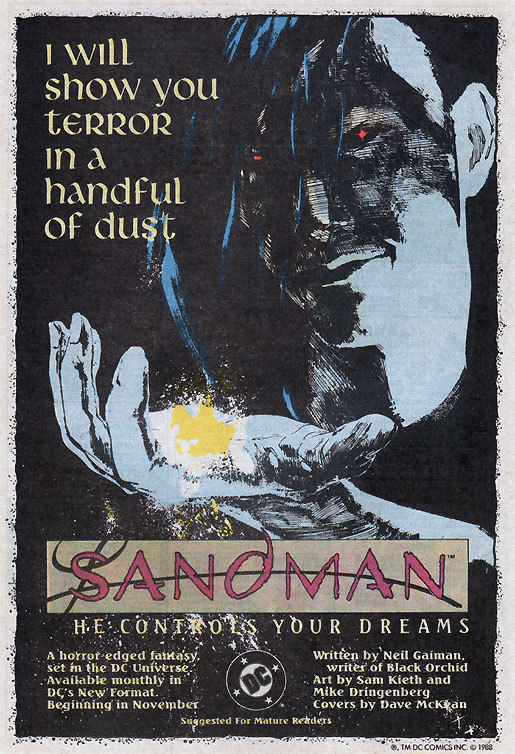
Keep reading below...
Warning: Contains some spoilers.
13. The Sandman Special 1: Song of Orpheus.
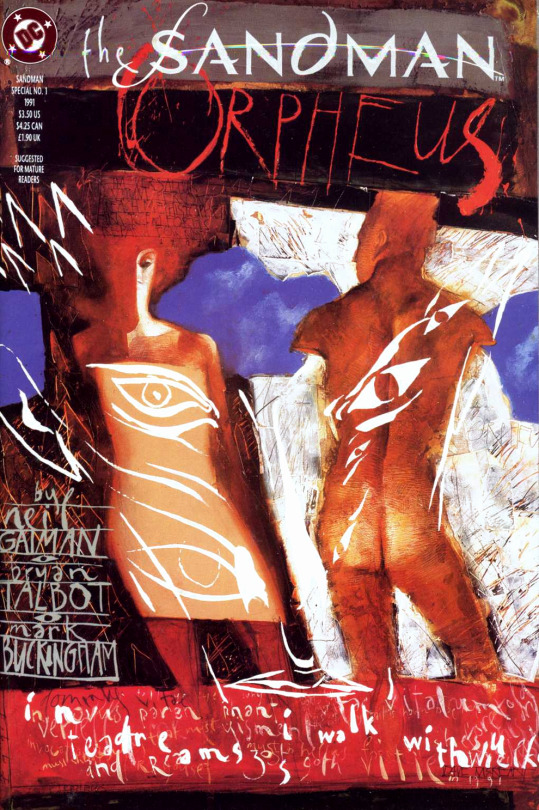
The Song of Orpheus is a backstory revealing Morpheus’ falling out with his son Orpheus and the slight revisions Neil Gaiman made to the classic Greek myth of Orpheus visiting The Underworld to try to retrieve his wife.
In The Sandman, Morpheus is Orpheus’ estranged father. I love the character of Morpheus but I’ll put it bluntly right here and now. He used to be an asshole. He may have even been easy to brand as a villain during his backstory.
Much of The Sandman is Morpheus’s redemption, setting right the terrible wrongs of his past. And in Brief lives he is forced to face the sins of his past in regard to how he treated his son. But here is where we get that tragic backstory and a raw, cold taste of what a jerk Morpheus used to be as a contrast to how much he grows later.
12. Sound of her Wings (The Sandman issue 8)
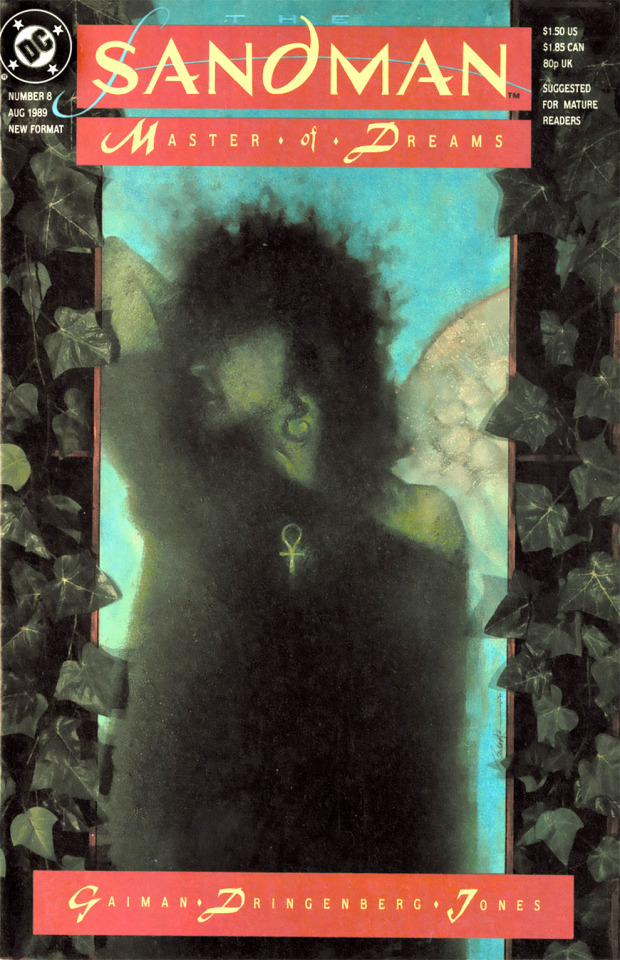
The Sound of Her wings is the issue of The Sandman that introduces us to Death of The Endless, Dream’s older sister (though she looks younger). Today she is the official living embodiment of Death for all of DC comics. Though I have to confess the main reason I like this one is how adorkable Morpheus is when he’s feeding birds. And that happy expression on his face at the end of the issue. You don’t see that too often with him.
11. Calliope (The Sandman Issue 17)
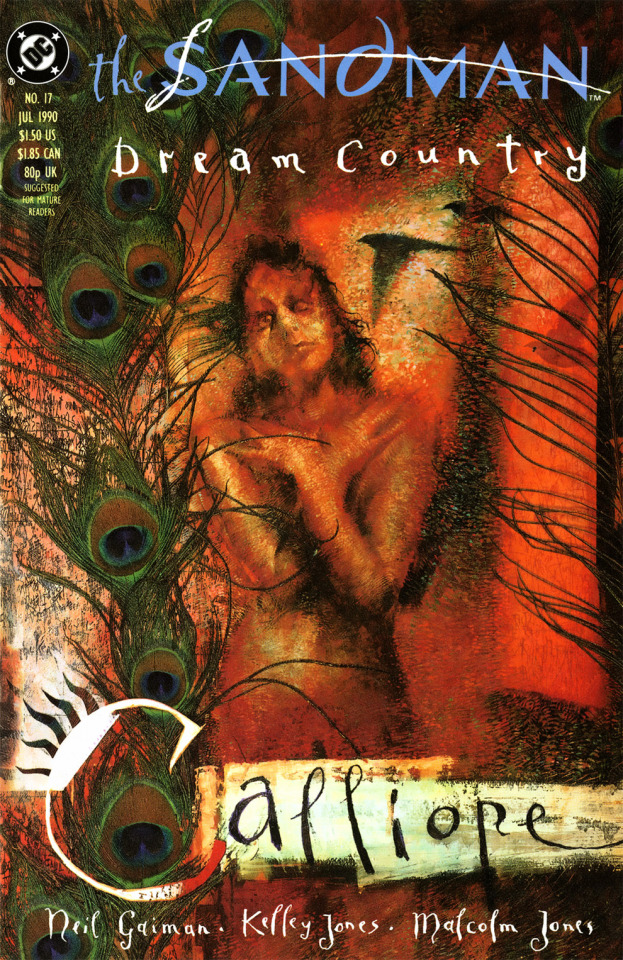
Just as Song of Orpheus shows us the assholary of Morpheus’ past, Calliope shows us just how much he has changed. The story is brutal and difficult to read but you also get to see Morpheus as an avenging angel figure, saving his ex-wife from an abusive master who sees her as something less than human.
Poor Calliope was captured and enslaved by mortals who have abused her in the most sadistic and insidious ways. It’s not just a man abusing a woman (that’s bad enough) but you also see a dehumanization. The writer currently exploiting and abusing poor Calliope has thought processes along the lines of “It would be wrong if she was a real woman.”
The fact that she is a muse- a supernatural entity- causes him to treat her as something less than a human being. This is actually a recurrence in The Sandman as we also saw how inhumanely Morpheus’ own captors treated him.
What happens to Calliope is a chilling display of the inhumanity that could also be an allegory for casual misogyny and to a certain extent, even racism. The cruelty is such that it’s hard to feel sympathy when Morpheus unleashes his anger on Calliope’s abuser.
This is also the first time we almost see Morpheus apologize to someone for his previous behavior but he doesn’t actually start doing that until The Season of Mists.
10. Soft Places (The Sandman Issue 39)
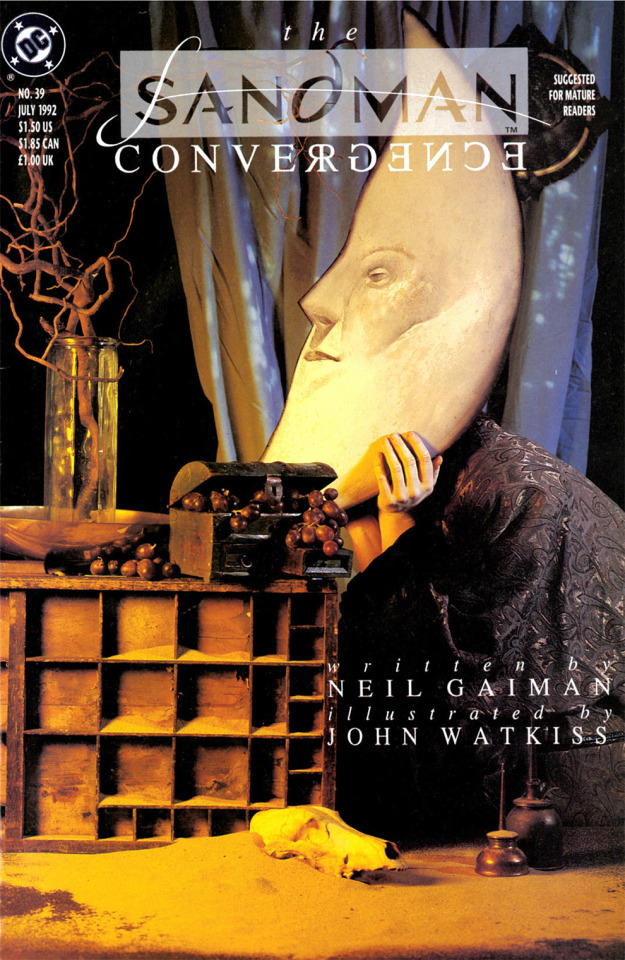
Soft Places is a story that can be read at nearly any point in The Sandman. What I like most about this issue is if you pay careful attention you realize that when Morpheus makes his appearance in this story he is actually between issues 1 and 2 of The Sandman. He was on his way back to the castle, weakened from his long captivity. And Marco Polo (lost in time and space) shows him pity and compassion and offers him his water. For this reason Morpheus helps him to get back home.
Morpheus sacrifices the last of his own strength to do this, leaving himself at the indefinite mercy of The Soft Place. Thankfully Gregory (the rather dog-like Gargoyle) finds him and takes him home to his master, Cain at The House of Mystery.
Not only did this give a satisfying story between the first two issues but also teased an what was yet to come and what was happening “Off camera” after the events of A Game of you.
9. The Wake: Epilogue: Sunday Morning (The Sandman issue 73)
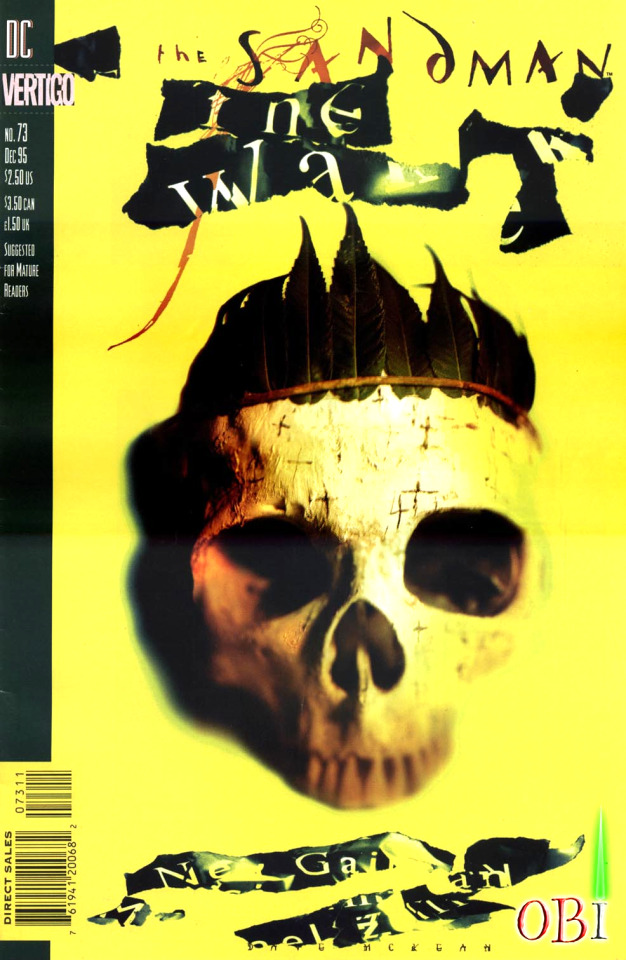
I always liked Hob Gadling (Morpheus’ immortal / formerly human) friend. Here we get a brief story about Robert “Hob” Gadling. He also tells about a dream he had and he is given the chance to die but (as always) chooses against it.
Hob’s indefinite life may have actually secured Morpheus’ own posthumous existence as a Dream Entity. The dream Hob had in this story was of Morpheus (after his death) and Destruction of The Endless. Here’s the thing though. At the time Hob had this dream Destruction really was visiting The Dreaming. And Hob had no idea what connection Destruction had with his deceased friend. He only knew Destruction as a street artist he had seen once.
The implication I get here is that Daniel brought Morpheus back as a dream entity. And with someone like Hob there to potentially dream of him eternally that secures Morpheus’ post-humous existance and freedom from having to be Dream of The Endless for all eternity. This is how I choose to interpret it. Call me a dreamer. ;-)
The artwork is also gorgeous in all of The Wake.
8. Midsummer Night’s Dream (The Sandman issue 19)
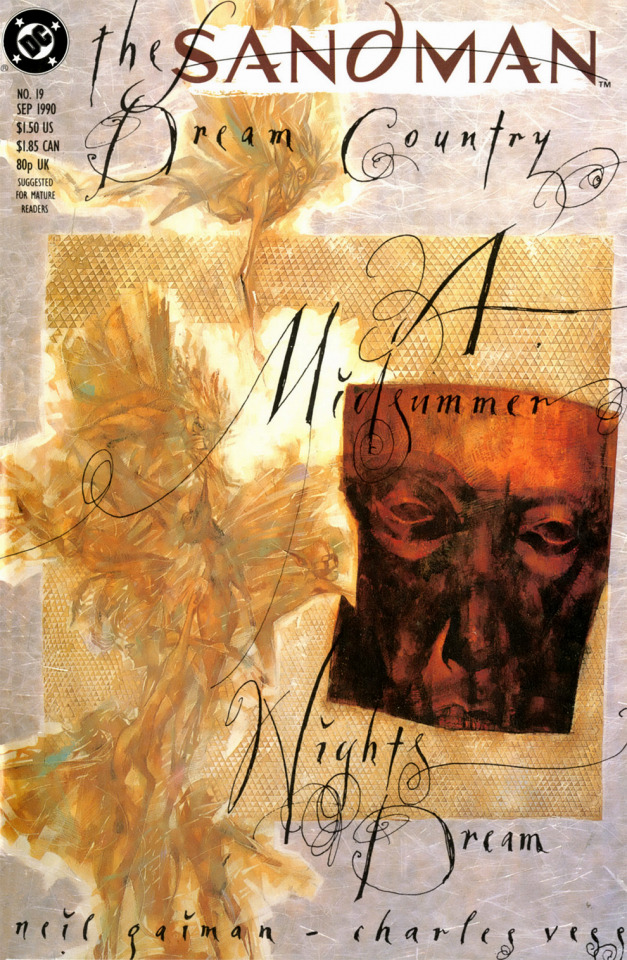
A Midsummer Night’s Dream happens to be my favorite Shakespearean play so this was a real treat. We got a fun story and a dark yet also delightfully wicked version of Robin Goodfellow (Puck). And we got a loving nod to Shakespearean history.
Morpheus has Shakspeare perform the A Midsummer Night’s Dream play for the real faery court. And all sort of things happen as well.
If you pay attention you notice Titania tempts Shakespeare’s little son. She also lures him to eat faery fruit. And anyone who knows faery lore knows what that mean. She has laid claim to the boy. He will become a faery and belong to her. And that is a nice, bitter-sweet way of addressing the loss of Shakespeare’s little boy.
The story also has one of the most unforgettable Sandman quotes. “Tales and dreams are the shadow truths that will endure when mere facts are dust and ash, and forgot.”
7. Overture Part 6 (The Sandman Overture Part 6)
I love The Sandman: Overture with all my heart. And it was difficult to pick a specific issue of it to be a favorite. I chose part 6 because this is the moment where Dream, Desire, and Hope save the universe. The metaphor is brilliantly obvious.
The artwork is gorgeous. And we get to see both Dream and Desire be heroes (”just for one day.”)
You also get to see exactly what happened to Morpheus right before his capture in The Sandman: Preludes and Nocturnes.

6. The Doll’s House Part 4: Men of Good Fortune. (The Sandman issue 13)
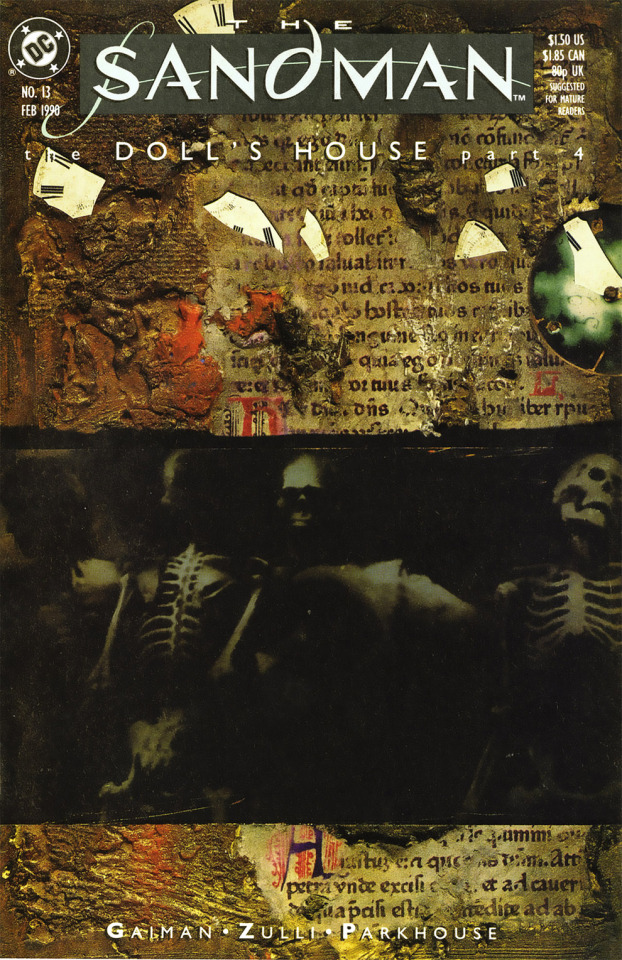
I mentioned before that I love Hob Gadling. This is the story that introduced us to him. Not only do we get the backstory of Morpheus’ immortal friend but we also get to see our proud antagonist finally swallow his pride and admit that yes, he has a friend. It’s one of the sweetest issues of The Sandman while also showing how people (in general) don’t really change. Individuals might but human beings are still human beings and the complaints of the thirteenth century are eerily similar to the complaints of the late twentieth century. This story is also the first time (I think) we see Morpheus say his indignant “You dare?”
5. The Parliament of Rooks (The Sandman Issue 40)
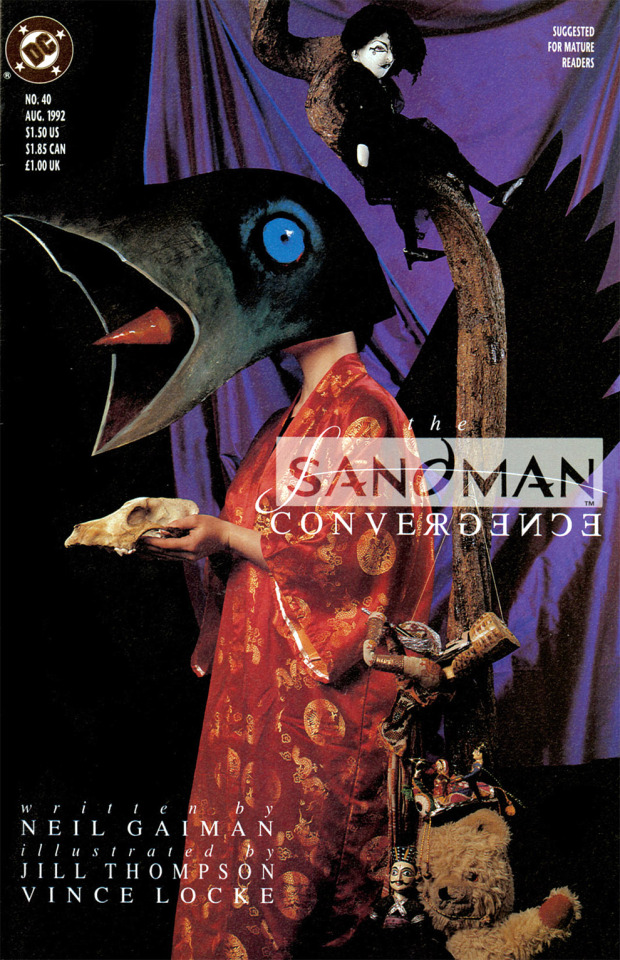
This is a fun issue. Baby Daniel lucid dreams his way to The House of Secrets where Eve, Cain, and Abel tell stories to him. Eve tells her own “three-in-one” tale and Abel introduces us to the concept of “Lil Endless.”
4. Season of Mists Part 2. (The Sandman issue 23)

This was a great issue. After all the build up of Morpheus planning to return to Hell to rescue Nada (whom he wrongfully left there ten-thousand-years before) and the fear and dread involved with going back there we find out that Lucifer has quit.
Lucifer explains to Morpheus why he’s shutting down Hell (Dialogue adapted by the Lucifer TV series for a conversation between Lucifer and Linda). He the asks Morpheus to help him cut off his own wings and finally Lucifer leave Morpheus with the key to Hell.
Now poor Morpheus must figure out what to do with the abandoned dimension and deal with the various Gods, goddesses and creatures of mythology and folklore who have come to try to lay claim to it.
3. Sleep of The Just (The Sandman issue 1)
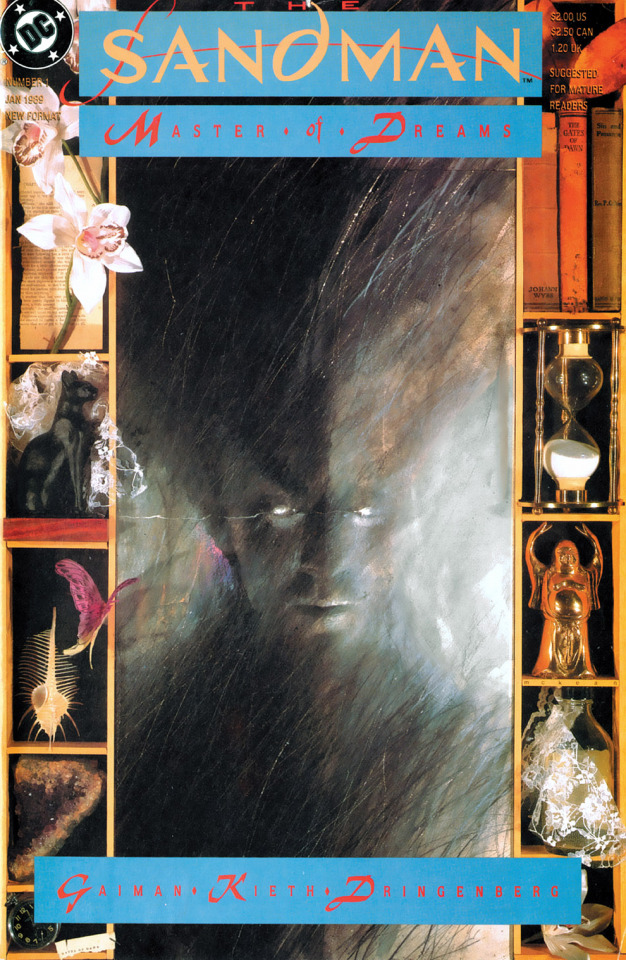
This is the very first issue of The Sandman and it was very different from the first issue of any other comic book I had ever read before. A LOT happened here. Where most comic book writers would have taken this story told in this issue and stretched it out for twelve issues, this was concise and brilliantly written.
The Order of Ancient Mysteries, lead by Roderick Burgess, summon and trap Morpheus AKA Dream of The Endless. They were trying to summon his sister, Death, but got him by mistake. He is held prisoner for seventy-two-years before finally escaping and seeking revenge on his captor.
What I like most about this issue is that the story really ropes you in and the internal artwork reminds me of a classic horror comic, something I really appreciated.
2. A hope in Hell (The Sandman Issue 4)
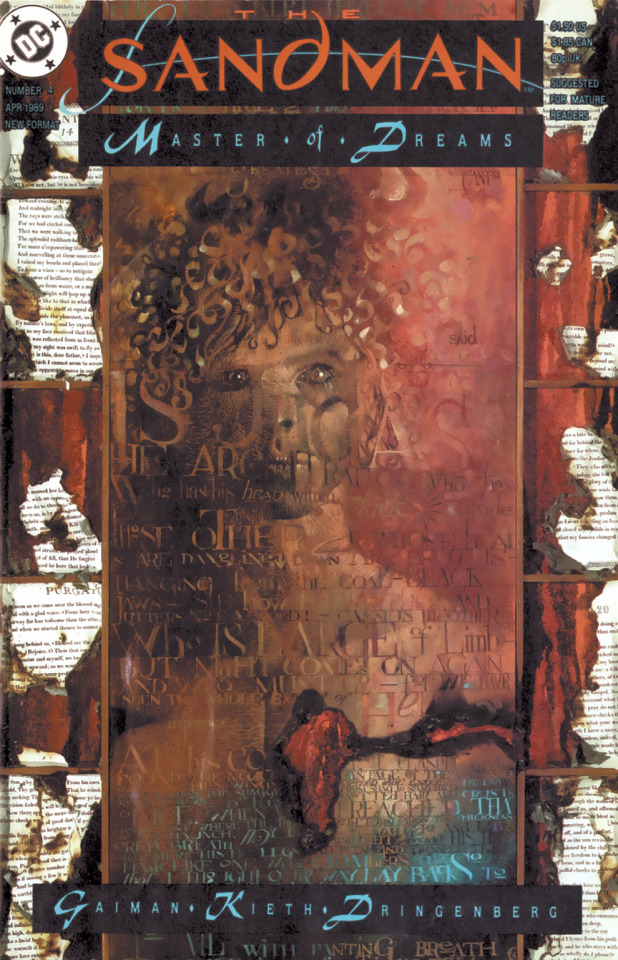
This is The Sandman issue where I truly realized I was reading something utterly different. When I first started reading The Sandman it was mostly to learn Lucifer’s comic book back story but I fast got hooked on THIS story and forgot all about Luci.
I must confess that though I am a life-long comic book reader I have a habit of skimming or out right skipping most combat scenes. I find them boring and often over the top. (I was a teenager in the 90s and early 2000s and got burnt out on over-the-top action scenes a long time ago). So I fully anticipated having to skim over certain parts of The Sandman.
However...
It was when I got to “the battle” in A Hope in Hell that I finally let my guard down and realized this was something completely different. This was never going to be like any other comic I had ever read. There would be no giant factory explosions or characters punching each other on busy center-fold pages full of sound effects and fire.
When I got the line “I am hope.” I finally let my guard down and understood the real magick in what I was reading. That was the moment I fell in love with The Sandman.
Also I love David Bowie.
1. Imperfect Hosts (The Sandman issue 2).
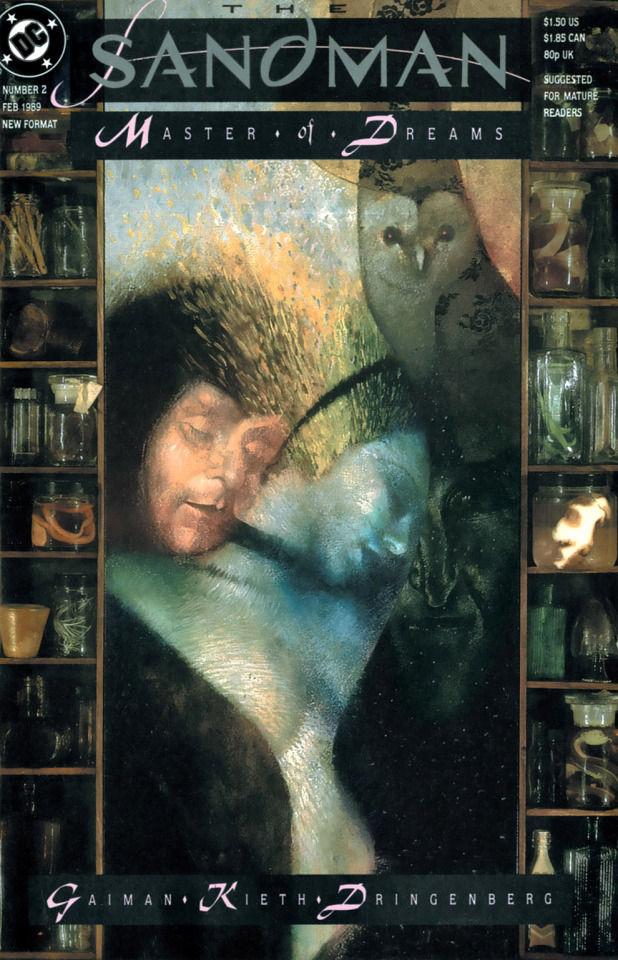
As you may have guessed A hope in Hell PROBABLY should be at number 1 on this list but I have a soft spot for Imperfect Hosts for what a delightful surprise it was for me.
I love Gothic Horror. I grew up loving anthology horror like Tales from the crypt. Imagine my surprise to discover The Sandman’s minion “Nightmares” entailed old school horror hosts. Even Destiny of The Endless, the mad mod witch (The Fashion Thing) ,The Hecatae, and Lucien The Librarian were all old horror hosts.
To see someone like the Crypt Keeper-esque Cain taking care of the weakened Dream Lord was a treat for me. I also noticed the loving homages to horror comics artist Bernie Wrightson.
Bernie Wrightson holds a special place in my heart because many years ago my mother gave me a large coloring book signed by Bernie Wrightson. I didn’t recongize the name but she recongized his style as something I like. And she was right. It turned out I already had several books that had been drawn by him but had never checked the name. I have long since lost that coloring book... and my mother... But Bernie was a reminder of how well she sometimes knew me. And this issue reminded me of Bernie Wrightson and so reminded me of her. So Imperfect Hosts had to take the number 1 spot.
It also introduced us to the adorable baby Goldie.
6 notes
·
View notes
Text
The Horizon Campaign (24)

Link to the Chuubo’s Marvelous Wish-Granting Engine RPG, on DriveThru
Link to Fortitude: the Glass-Maker’s Dragon, on DriveThru
Let’s talk some more about the Horizon campaign(s)!
Previously,
We worked on our set of Main Characters and concepts, tied them to Arcs and colors and archetypes, built Rinley’s storyline, and got most of the way through their quests.
Then, we built quest 5,
Finished the quest set off,
And summarized what we had!
Before starting work on a new character: Sal.
Today, that character study ... continues!
When We Left Off
We were just trying to rewrite Sal’s first story to give him a better reason to be interested in historical investigation.
Book #1: Salid and the Beast
Sal is just a puppet on the end of a tentacle of a giant soul-eating beast, but a long time ago a historical scholar fell into Horizon’s underworld and could not get back out. So instead they taught Sal how to read, and talk, and do historical scholarship, and filled Sal’s head with the glory of teaching and the wonders of the surface, and then died. Tragically.
Now Sal is lurking in the steam tunnels under school. He listens to classes. He spies on students. He sneaks up at night to try to help them with things that were not fixed in day. He is mournful that the history department is not making much progress on the great puzzle of “the evil island,” which is to say, what brought Principal Entropy I to Town to begin with.
He studies ancient pictures of the beast down below. He makes friends with some students and is hunted by others. But it is not until he overhears the ...
Hm
Going by yesterday’s account, he’d overhear scholars talking about how if only they could consult with Sa’a Lingurth, they’d know something.
But, does he actually know anything on account of being part of Sa’a?
... wait!
Yes!
He does, there’s the A Tangled History part of Allegory.
OK, darn, this pause in the story was going to be because I thought he didn’t know anything, and so I was going to shift from “if only we could talk to Sa’a Lingurth” and Sal stepping up to like, Sal hearing the Principal or someone telling the history teacher that a puppet on the end of a tentacle of a soul-eating beast could teach history better than this!
And then he could be all, aha! I have found my calling!
But if he knows things because of A Tangled History, it could also be, just, he hears the history teacher talking about the benefit of first person perspectives on things, or how if only they could get firsthand information from the beast of the evil island, they would be so much better at this ...
Hmm.
To be honest, I kind of like the idea that the Principal, or the Vice-Principal maybe, someone, goes around saying, “A puppet on the end of a tentacle could do X better than this!” about everything. Maybe even the original teacher does.
Maybe I will go with that.
Which means ...
This is starting to turn into a viable story outline.
The thing he’s stuck at is fitting into human life. Fitting into the lives of these people he wants to hang out with.
And he’s actually a great history teacher all along, thanks to Allegory—he just doesn’t recognize it.
(Honestly, that pushes hard for Allegory 2, which I will have to consider.)
So this two-book Arc is the story of how he becomes one.
What Lurks Below
Sal lurks in the steam tunnels beneath the School. He wants to be part of things but he does not know how. So instead he listens to classes, spies on students, and sneaks up to the surface at night to try to help with things that were not fixed in the day. (As a practical matter, he presumably becomes attached to the PC group and starts speaking through floor vents and such by the end of the first session in all but the most high-concept games.)
His backstory is that he’s a puppet on the end of a tentacle of a giant soul-eating beast, and for most of his existence he couldn’t talk or cook or do historical research, but then the former history teacher fell into Horizon’s underworld and couldn’t get back out (owing in part to his attachment to
researches types of history
the Marxist methodology of “history from below.”) Instead, the former history teacher built a stalagmite-house in the deep dark, taught Sal how to read, talk, and do historical scholarship, filled the young puppet’s head with the glory of teaching and the wonders of the surface, and then, tragically, died.
The current history teacher is obsessed with the riddle of the evil island and why Principal Entropy I came to Town and has a strong tendency to tell people, “A puppet on the end of a tentacle could do X better!”
More Probably Migraine-Based Troubles
... this isn’t quite right.
This isn’t quite right because it’s an Aspect Arc, but it’s not focused enough on what Sal is training.
It’s supposed to be an Aspect 1 quest, after all!
What Lurks Below
Sal is practicing to be human, but most experiments just end up with him running away to hide beneath the school again, talking to his friends only through the vents and by occasionally slipping a hand or tendril anyway up through something to move something. He wears very heavy robes and hood most of the time when he’s up on the surface but not necessarily at night—sometimes he listens to classes, spies on students, and other things from below, and hears things he wants to fix at night, and when he sneaks up then he is generally less overly encumbered.
... no, that’s too weird
I think I want Allegory 2, Reality Syndrome 1, so that he can both lurk below and interact.
Something like:
Below
Sal lurks below the School, in the steam tunnels, but he wants to be more. He doesn’t want to just be another monster. He wants to find a purpose. He is too shy to let people see him at first, but he uses advice and tendrils that come out of basically anywhere to help out in various ways. Most of all, in this story which—as a novel—would be vignettes about the weird students of Horizon, he helps them through his knowledge of the history of things, some picked up from a deep source he doesn’t want to think about and some from his mentor’s teachings.
His backstory is that he’s a puppet on the end of a tentacle of a giant soul-eating beast, and for most of his existence he couldn’t talk or cook or do historical research, but then the former history teacher fell into Horizon’s underworld and couldn’t get back out (owing in part to his attachment to the Marxist methodology of “history from below.”) Instead, he built a stalagmite-house in the deep dark, taught Sal how to read, talk, and do historical scholarship, filled the young puppet’s head with the glory of teaching and the wonders of the surface, and then, tragically, died.
Having reached the surface, Sal rejects every purpose people propose to him, but still hangs out around the history class in particular.
The current history teacher—well, the one of them that is story-relevant—is obsessed with the riddle of the evil island and why Principal Entropy I came to Town and has a strong tendency to tell people, “A puppet on the end of a tentacle could do X better!” (This is a habit that probably started after the first time someone tried to tell him about Sal?)
And one day, the students turn that around on him, or an administrator does, or he sulks and does it to himself: “A puppet on a tentacle would be a better history teacher than this!”
And Sal realizes:
Wait. (Seizhi Voice) THIS is my DESTINY (/Seizhi)
Book 2
Book 2 comes in two parts. The first is the “alternative perspective.” The second is the “hectic social stuff.”
The first almost feels like it wants to be about flashbacks. (To growing up with his mentor.)
Hmm.
Shower thoughts:
let’s formally title book 1 History from Below, and then book 2 can be Social History.
Some of the ridiculous social hijinks include an inherited engagement and possibly debts to kneebreakers (though, good luck) and such from the previous history teacher.
It ends with being forbidden to teach further. But: “they need me,” and going right back to class.
I suppose that means the book might want to begin with the contrary element to that. With something that’s the opposite of “they need me” and going right back to class.
… Right, like, the beginning is presumably Sal not really being sure how much he’s bringing to the kids, but at least he’s there, and it’s giving him a chance to do stuff in human society.
... except, slowly, he gets the idea that the kids are dramatically underserved. That there’s a past that’s being hidden from them. I’ll probably have to define that more precisely.
... Or, no, let’s just say that the “alternative perspective” is the perspective of a highly protective teacher. Or, what he sees as a teacher is mostly students getting ground up by the system, and the understanding about humanity he gets from this is mostly about surviving by sticking together.
Like, the light of wanting to help these people gets kindled in him (Aspect 2), and then he gets mostly distracted by bureaucratic stuff and zaniness (Aspect 3) while someone’s situation gets worse, but ... he ... is still helping them in class, or something?
Continuing ...
Let’s leave book 2 there for now, since we seem to be chipping away at all the books slowly rather than getting one perfect and then moving on.
... and let’s look at book 3!
Now that book 3 ends with Reality Syndrome 3, the idea that it’s about a confrontation with a rival puppet is even more likely. That just ... fits?
Book 3
Book 3 starts with Sal hosting a renegade class---either roving from place to place within the School to stay ahead of the inspectors or, if the students liked him, setting up just outside it.
The grand challenge of this book is to establish himself in control of more of Sa’a Lingurth’s extent into the world, apparently.
This isn’t singing, yet; I think the reason for that is that we’re still missing some piece of the core motivation.
Let’s finish up the basic plotline before we tackle that, though!
Sal, anyway, is running a roving class when he becomes aware of his opposite number. At first it’s probably the touching story of finally meeting someone else like him—after all these weeks, another puppet on the end of a tentacle attempting to infiltrate human society!—but eventually he realizes that something sinister is going on here. He’s forced to try to stop his rival puppet’s plan to infiltrate the highest levels of School administration and take it over, ushering in an era of darkness and New Math.
Ultimately, though, it leads to the collapse of his own class. He feels he can’t keep teaching after what he’s learned about his own wicked potential.
Additional Thoughts
The main problem with this storyline, in practice, is likely to be stretching it out over a whole Arc; it’s easy to play dumb, and easy to play smart, but “catching on very slowly” is hard.
The title could be “Political History” or “Diplomatic History” or maybe “The Giant Manta Whale Theory of History?”
Book 4
There’s a pleasing symmetry to having book 4 be about dealing with Principal Entropy I’s legacy in some way, because this is also when Rinley winds up dealing with it. Of course, a Chuubo’s campaign can’t rely on stories synchronizing like this—even if people are doing them simultaneously, starting at the beginning, with the right PCs on the right stories, one player might be slower or faster. On the other hand, more symmetry is always better than less.
And I do think that that’s the logical step here, because if there’s a real enemy behind the other puppet, which the “Hero” progress requires, it has to be Entropy, and it can’t be Entropy II, so ...
Anyway, this storyline takes us up to Hero 4. To “all is lost.”
As the process of gaining Reality Syndrome 4, it’s also about grasping others’ truths. I think I’ve drifted around at this point to thinking of the Syndrome’s Experience, not as “majesty,” but as some sort of memories/flashbacks/past. So this story is about building a team of people who are in a similar situation to Sal:
Clearly not what the accumulated work of time and wishes and miracles has done to them.
... it’s tricky in that conflicts with how Entropy I works thematically, though. Like, the conflict as proposed and the thing they’re fighting don’t quite fit?
Spoiler: elegant as it is, I am not going to be able to maintain Entropy as the antagonist here.
Additional Thoughts
Probably this is where Sal and team deal with the leftover shade of pre-modern and possibly even pre-Academy Dulcinea who is trying to protect at least her alteration to the state of things? I guess the title is Consensus History.
It ends with all being lost, which ... may mean that Sal doesn’t like who he is when he remembers.
Book 5
This one goes to Hero 5. It needs to get to the point of a big victory, then a bigger threat in the wings.
And also to Reality Syndrome 5, which is mostly defined by the ability to break one’s System’s limits.
This one ends kind of horribly, I suspect. For that very reason:
Aspect 5 ends. He finds his way home. He’s mastered being Sa’a and come back from wherever that involved going to School, and ... he realizes that that comes with the soul-hunger.
“All around, the people of my cherished home, my students, my peers, my family: like so many delicacies, wrapped in their flesh.”
Which probably means that it starts with him refusing that.
...possibly that’s too horrible
(particularly for the ending of the last book in a PC’s Arcs.)
Trying Again
I suppose that this one might be about the nature of the evil island, instead?
Like, book 5 is about his struggle with the soul-eating nature of Sa’a Lingurth, and then when getting past that, he understands why there’s an evil island flying around the sun on the back of a soul-eating beast and that just going vegetarian isn’t enough?
Speaking of Which
Why is there an evil island flying around the sun on the back of a soul-eating beast, anyway?
I think the beast, I think the reason for the beast, is that it’s a representation for fear of the abstract, or fear in the abstract, that’s buoying up and isolating Principal Entropy I’s more specific evils.
I think that maybe there’s a metaphorical thought there, but also, more importantly, I think Sa’a was a device, like many other devices, created by the original Lord Entropy to keep his innate tendency towards corruption from affecting things he didn’t want to break.
As a buffer, of sorts.
Y’know?
And that any breakdown in that system caused by a change in the nature of the beast of the evil island would mean that Sal wouldn’t be able to act as such a buffer any more.
So book 5, which is probably, like, Intellectual History, or Academic History, or possibly closing the circle and being formally Dialectical or Marxist History, or maybe Progressive History because it represents progress?
---Wait, no, it’s Ancient History---
So book 5 is going to start with Sal wrestling to re-establish a sense of self after the revelations in book 4, and then move on to memories of the old Entropy ...
Hm.
That indicates that I’ve lost that synchronization that I was bragging about. Still, I’ve gained something, which is, confirmation that quest 2 in this Arc is flashback-heavy ...
... and then there’s weird social stuff probably relating to a love match with the Prince of Cats’ ship or the Headmaster’s dead leviathan; and that’s not enough, so, maybe, byzantine barriers in the way of registering an identity in Town as a giant mantawhalewhatever?
And that’s quest 3; then quest 4, a struggle with ... uh ...Probably some ancient evil ghost-king? that really needs a soul-eater to deal with it so that Sa’a can be full before switching diets?
and then trying to disentangle from the original purpose, and then achieving that transcendence.
Yay!
Victory!
Of course, that means the island too begins to fall.
How Much of This Are We Keeping?
Tomorrow, let’s evolve these into their final form, not coincidentally as we hit the part of this that I was working on as my migraine finally began to fade. ^_^
12 notes
·
View notes
Text
The Myth of Persephone in “Persephone” by Loic Locatelli-Kournwsky
This is a really weird one. This graphic novel, I think intended for a young audience, utilizes concepts of the Persephone myth but is so divergent from the original that I can’t help but think it might have been a better read if it had just used totally different names and let the audience figure out what it’s based on. It falls in that sweet spot where the story is so different that the names are distracting but close enough to the original that I think the author felt it necessary to keep the names to make the parallel explicit.

The art reminded me a bit of a sketchy “Nimona”.

The back said it was a modern setting but it’s really a fantasy setting. Also all the people kind of dress like it’s the 50s. The premise is that above ground is Eleusis, a diverse land which has hereditary mages, and below is Hades, a land of the dead but also just a regular community.
This bit right here is 1. the closest thing you get to the romance aspect of the original myth and 2. one of the only times Hades himself appears. Hades, the guy, is only mentioned in flashback.

And they are never explained and this basically isn’t mentioned again aside from the fact that his wife’s death drove Hades crazy.

Here’s Demeter the Fierce, a powerful mage, with young Persephone.

Modern Eleusis.

Somehow Persephone is taking three sciences and no language or literature. Her botany skills are basically the entire premise for her story specifically.


Here we establish Persephone’s inferiority to her witch mother. She needs to find her place in the world. Yes, it’s with botany.

Hera and Hestia get a callout as Demeter’s younger sisters who don’t appear.

Persephone is on the road to Hadestown and is reading her mother’s diary.

This villian man is not Hades. No idea why they invented this character to basically fulfill Hades’ role in the story.

Persephone and her friend end up in Hades because the train when wonky.

The Abduction Of Persephone.

The Forcefeeding of Persephone so she can’t leave.

Persephone falls off a cliff and meets the townspeople of Hades with a very bad joke.

Growing up theme, I guess..

A myth character who doesn’t actually serve the same myth function. Also he’s the son of Hades and the queen.

Azrael is a Biblical angel. Minthe is a slut or ex who tries to seduce Hades. That is not the function either of them play here.

I think Hades is a Hitler allegory.

So I think we know why Persephone was kidnapped now. Someone wants Tartarus’ powers.

Persephone is motivated to feed the starving people of Hades. A noble goal.

While messing with growth potions, Persephone seems to grow herself.

The message of the story. Persephone doesn’t have to live up to her mother’s example.

I just thought this panel was cute.

So the Titans are where the special powers of Tartarus come from.
There’s a whole thing where the chancellor of Eleusis is evil and used Demeter’s love of Persephone to get to Tartarus for the power and is defeated.

Persephone makes a deal with the dead that says she will stay in Hades to grow things from the blue streak in her hair, the sign of her tie to the underworld when she was made to eat the fruit. She does and decides she likes it there and will presumably go back and forth but nothing is established or anything.

A pretty end shot.
So yeah, this is very little like the original myth. It’s cute but it feels like a totally different story and the myth aspects are really distracting to the story.
8 notes
·
View notes